#(obviously i relate to and am interested more in one than the other. that's how it works for everyone)
Explore tagged Tumblr posts
Text
Seriously, academics and the like are flawed like the rest of us, so use critical thinking skills even when you're talking to an "expert" (obligatory disclaimer half because this is the internet and half because I majored in philosophy and am wont to quarrel about what exactly counts as an "expert" because my brain is wrong)
BUT
I promise that, in general, they will be very happy to talk about their work. Academics in particular, a lot of them I've known, don't get to pursue exactly what they want all the time. So when you engage with them on topics they actually have a background in, they sometimes forget how to act and infodump with the enthusiasm of your autistic friend who lights up talking about their special interests. All the ivory tower pretentious bullshit you sometimes have to cake onto yourself in that world, it can just crumble to dust with the force of their excitement about actually getting to talk about things that interest them rather than having to publish for publishing's sake or having to teach a course because someone in the department has to and it's their turn. (Seriously, I don't know if this is common knowledge, but that's actually how some departments run things: I taught the intro course last year, so it's so-and-so's turn next. See, for example, the dude who taught my intro to astronomy course. Lecture was a snoozefest. The planetarium and outdoor work? He was a different man. The final grades for the class had like a 40 point curve. It was kind of a mess. But it was cool when he actually wanted to be there.)
I used to say that was my favorite part of academia, but then I realized it's the main thing about that world that drew me in: I wanted a place where I would be expected and encouraged to explore in ways I wasn't allowed (or wasn't able, not having the resources and living in a small town) to do when I was a kid. It didn't work out the way I wanted it to, but that's a story for another post.
It's why I love libraries. There's a "bookmine" near me (I don't want to doxx myself naming it but DM me if you want and I'll elaborate) that I would fucking adore to roam for days and days. Or just nights. You know, sneak in and hide in this massive building full of books, wait for them to close and go home for the evening, and just go to town exploring various subjects. Also my partner would be there so we could gab to each other about our discoveries. I feel like a lot of people, academic types especially but not exclusively, can relate to this yearning to explore and share.
Don't feel like the only people worth talking to are folks with advanced degrees or prestigious titles, though. Academics can be easy to find relative to other kinds of experts, but good information can come from anybody. Not just somebody with an email address ending in edu. At the same time, beware of influencers and whatnot, obviously. Good information can come from anywhere, and the same is true of bad information. Someone saying things with a lot of confidence isn't necessarily telling you the truth and doesn't necessarily know what they're talking about.
Anyway. Send the email. I promise you're not bothering them by asking about the thing they literally got at least one advanced degree learning about on purpose (in the case of academics, but like I said, this can apply more broadly than that; read the room and shoot your shot, or whatever the kids are saying nowadays). I have a lot more to say about this and may even make a post to help people find experts in a given field of study and how to use responsible critical thinking skills and research methods more generally, especially if anybody expresses an interest in any of that. But I've babbled enough on somebody else's post lol I apologize and also it will happen again
Signed - your local autistic philosopher weirdo who just really really likes information and libraries and finding and exploring cool stuff and can't shut up about it sometimes

#also beware of most people who call themselves philsopher kings or warrior poets or stoics#same with people who describe themselves as sapiosexual#most people are chill but in my experience most internet randos who talk like that have a lot of growing to do#at a minimum#i mean don't write anybody off just on that basis alone#i would advise that about most individual characteristics out of context aside from eg bigotry#i'm just saying it's often an indicator that the person is at best insufferably pretentious and not as infomed as they think they are#at worst it's like the weird slide from cottagecore aesthetic posting to tradwife bullshit and suddenly they're talking like a nazi#which is why i keep emphasizing critical thinking skills#anybody can be a fraud and anybody can be taken in by one#don't think you're the exception#that's how they get you#so send the email but don't assume someone is a reliable or credible source just because they work at a certain place#or because their email ends in edu#this has been a psa from your local grad school dropout#i really want to get my MLIS tho#another story for another post
12K notes
·
View notes
Text
wishing we had a complete third part of the epic cycle for no other reason than to have a surviving epic that'd be undeniably The Worst One so we could stop with the endless "iliad versus odyssey: which one rules which one drools" non-discussions
#guys they're both considered greats and they're very varied and we're blessed to have two such unique pieces of storytelling#is what i say when i'm not being a bitch going 'oh SORRY if the iliad is TOO STARK IN ITS HUMANITY for you...!'#(obviously i relate to and am interested more in one than the other. that's how it works for everyone)#(mistaking preference for quality is an intellectual dead end)#now if we only had the cypria or the little iliad to be the dull disjointed one
72 notes
·
View notes
Text
There's a lot about discussion of hdwr that baffles me (not all discussion to be clear, because i do think there's a lot of good discussion about hdwr. But equally so are there the ones that make you wonder if you're reading the same story) and I think one that is especially annoying is the constant infantilization of miwa as this passive eternal victim. It drives me up a wall because this is quite literally an issue she's struggled with within the text of the story! She had an arc about how she dislikes how people treat her this way like towards the beginning of the story! And like even ignoring that, this story is about like nuanced and realistic portrayals of being in relationships and learning how to navigate them and so it's like what's the point if you're going to immediately reduce the characters to "the victim" and "the victimizers?" Is that even interesting? Is that a useful lens to look at interpersonal relationships?
#how do we relationship#hdwr#this is about the poll in the subreddit but i also saw similar comments (mostly about sae) on the website i was initially reading hdwr#i dunno like i'm like miwa fan numero uno so like i get ardently defending her but in my opinion#part of what makes these characters interesting is that all of them are extremely flawed in ways that can negatively feedback on each other#miwa has also done bad things to the other characters and been bad for them as well#i do think miwa repeatedly trying to turn being fwb with sae into a second chance despite sae clearly saying no#and repeatedly breaking sae's boundaries during that time was bad and shitty of her#i do think her avoiding tamaki and trying to supress her feelings despite that not being what tamaki asked for or wanted was bad andimmature#i do think that while miwa was under no obligation to say it to her i do think miwa's inability to tell sae that she loved her#even while asking to get back together was undeniably bad for sae as someone who had insecurities about being loved#personally these things are not unfortunate irredeemable aspects of her character#nor do they justify or excuse what happens to her#but instead characterize her as being inexperienced with romance and having strong feelings she isn't always able to completely express#or understand fully. this is an aspect of her character that is relateable and understandable to me#i find it hard to say that if i was in her position i wouldn't make the same mistakes as her#and like this is just one aspect of miwa's character. she of course has more than this which is why i am miwa fan numero uno but also#the same is true for like all of the main cast#they have depth and flaws that are relateable and realistic. even if you don't like a character's actions they're internally consistent#within not only the character themselves and the context of what they've been through but also the narrative itself i feel#which is why i like this story#so it feels unfortunate to flatten that all into who hurt who more or who is innocent and who is evil or whatever#like yes i obviously do think what sae did in like volume 5 was bad i also think what she did in vol 1-4 were also various shades of bad too#yes i do think what tamaki did in 103 was obviously bad#i mean ch. 119 and ch. 120 most likely are about exploring the consequences that has had on miwa#i just don't think it's useful interesting or even correct to look at those events as 'bad people doing bad things'#also while not related to miwa i think people who treat yuria and sae's relationship this way also baffle me i cannot understand it#channel 3
15 notes
·
View notes
Text
About Davrin's little blurb on the official website for Dragon Age: The Veilguard...

"Though he was raised in a Dalish clan, he craved excitement and adventure. He'd rather make history than reflect on it."
There's actually a lot to unpack about these two sentences.
First off, placing the word "though" in front of being "raised in a Dalish clan", gives such a thing a negative connotation. The word "though" is used in a way that sounds like "despite", as in, somehow wanting excitement and adventure must go against being Dalish. This correlates with sentence that follows. "He'd rather make history than reflect on it." The word "rather" is yet again used to separate Davrin from his Dalish origin. All together, this promotional description of Davrin is insisting that he is "not like other Dalish".
Now, obviously the game is not out yet, so we do not have total confirmation on what the nature of Davrin's relationship to his culture is really like. But there is absolutely something to be said about promoting the character this way, regardless of however he actually turns out in game. There is absolutely something to be said about how, as @/the-eldritch-it-gay put in their tags here, why do writers feel the need to make fantasy minorities hate or distance themselves from their culture? As a selling point?
Maybe this is completely misleading bullshit, maybe it isn't. All we have to go by, is what BioWare chose to say here, and their past track record with elves:
Zevran may talk about his mother in a font way, but he still has the line, "Too many of our kind think we deserve pity simply because we have failed to defend ourselves."
Velanna is one of the two elves we've had who is overtly proud of her culture, yet she is treated like she is unreasonable and too angry because of it.
Merrill too, is proud of being an elf, and of being Dalish. The story punishes her left and right for this, treats her like a child, and in the end she is either ostracized from her clan or they end up dead because... she cared too much?
Fenris has pretty much zero engagement with elven cultures, and spends his time ridiculing Merrill for being proud of hers.
Solas complains about the Dalish from the start, and says plainly that he does not see himself as having anything in common with elves of current time. "Oh, you mean elves" he says, when the Inquisitor asks how he feels about his people; the thought does not even occur to him.
Sera is... Sera is a character who could have been a really interesting examination of overcoming internalized racism, if she was written by someone competent with the subject. Instead, she just cringes at everything "too elfy" through the entire main game, and only has a single line in Trespasser that hints that she may have a personal struggle going on. But it's still left unresolved.
That's a lot a lot of negativity. So of course seeing a suggestion that more is to come with Davrin has people wary and tired.
Let us also consider the fact that Davrin is overtly Black as well, and what that means. Acting as if one must disregard history in order to make it, as his description so claims, is bullshit. It sounds too much like promoting gentrification/assimilation in my opinion; the idea that you cannot keep your culture if you want to be successful.
I also think that it goes even deeper, on a meta level - I think that BioWare is afraid people will not be able to like or relate to Davrin, if he is "too ethnic". I think that BioWare is taking this Black character and instead of questioning how he can best represent marginalized fans - particularly Black fans - they are questioning how to make him more relatable to white fans. And the only answer to that is to, of course, make him seem like he is an exception to marginalization through separating him from his people.
I am still holding onto hope that Davrin will overall be an interesting, well-written character. And I sure as hell will still be defending him from the people who are already hating on him or ignoring him completely because of their racialized biases. But that does not exempt BioWare, and specifically his writer, John Dombrow, from any criticism. This is not about Davrin the character, this is about BioWare the company's handling of Davrin the character. And in that regard, they're not off to a great start with this.
701 notes
·
View notes
Text
(ran this reblog through a discussion with some people who have more experience in storytelling/gamedev than i do and some who are central asian indigenous [which i'm not] to get their point of view on the Kin so it's probably going to be long because I'm condensing multiple discussion pieces in one, it's gonna be one of them Long Posts)
while the Kin is obviously heavily inspired by the Buryat, including in its language which does contain a lot of Buryat words, but also a lot of not-Buryat words (Yargachin, pointedly incredibly important in the game, is Mongolian directly. as stated above, Yas & Merdrel are also Mongolian), I do not know if I agree that finding the other inspirations is "forgetting that and trying to match them to other cultures". The Kin is not "its own somewhat distinct culture", it is its own, imagined, invented, imaginary culture, which takes inspiration from (/plainly steals) from existing ones. It is an imaginary people with heavy foundational roots, in the same way the town is imaginary with heavy foundational roots, and the disease itself is imaginary with heavy foundational roots. It is obvious the game takes inspiration from the Buryats (and from others), but it also, in the name of storytelling, creates a religion which is almost an inverse of Buryat Tengrism (Tengrism, with Kyuk-Tengri, father-sky-god as head of the pantheon, being, from what i'm understanding, pantheistic [the Main God is in everything, and everything is a manifestation of him], polytheistic [while Tengri is the main one, there is a heap of other gods, goddesses and spirits under/around him, with great importance placed on those spirits [44/55 associated with different things]], and of course with a main head of a father-sky-god; whereas the Kin's religion, with Boddho, a mother-earth-goddess* [whose name seems to relate more to Mongolian], is pantheistic [mother Boddho is in everything and everything is a manifestation of her], monotheistic [she is the only one, the all-mother, all-creatoress] OR duotheistic [her + Bos Turokh are the only deities], and lacking in spirits entirely, which are so important to Tengrism), has an important spiritual caste of women (the Herb Brides) who have no resonance within Altaic/Mongolic/Turkic cultures because no culture has Naked, Dancing Young Pretty Women Whose Sole Job is Dancing For Harvest (some types of goddess-priestesses / witches / oracles have always existed, but the Herb Brides are a distinct, obvious invention, which deserves scruteny. you could argue that they correlates with shamans, but in the text it appears evident that is more the place of Burakh [father, then son], and the Herb Brides directly go against a widespread shamanic practice which is the wearing of many layers made of animal skins, bones, antlers, horns in order to disguise oneself, to wander between worlds, to trick the tricksters, etc), and also like. Worms. "crude", "unfinished". half-man half-dirt.
*the cult of an earth-mother/mother-earth exists in Buryat Tengrism with Umai, because earth-goddesses exist/have existed in most pantheons, especially before the advent of pastoralism; however, she is daughter of Tengri, whereas Boddho is all-mother. Mongolian Tengrism has her be named Etugen, and while she is said to have all control over the natural forces and all living forces be subordinate to her, Kyuk-Tengri is still "above" her, she is the "second highest" after him. the existence of a earth-goddess within two religions does not make them more similar than any others (the Greeks had an earth-goddess, Demeter, with theories that she was there before the advent of the hellenic pantheon as an all-mother... etc etc so on). there is also sources stating that at some point, Tengrist or proto-Tengrist peoples might have worshiped him/a sky-father exclusively or so majoritaly that the other deities were aside, but it could also come from biased or outside sources.
we are also unsure about your claim that the Kin represents the Buryats in "interesting and careful" ways. We do not know of your position wrt indigenity (and it's none of my business specifically, might be the business of those in the group who are indigenous but i'll let them decide if they want to contact you directly) and if you were doing research on the Buryats out of a reconnecting journey or intellectual curiosity/desire and personally feel that the Buryats are respectfully represented in P2 as one, but I have read many other Central Asian Indigenous people in this fandom write, since the release of P2 (and possibly before that about P1, as well as in the discussion we were Just Having about this ^) about how the Kin does not represent them faithfully, or even sometimes just kindly, and the treatment of it and its members being insulting in multiple ways (including the fact that their beliefs and language are a hodgepodge of languages and beliefs that feels to "steal" from multiple sources [=appropriative instead of appreciative] which itself is another discussion, do not represent any real-life religion while obviously being inspired by some, and on other levels just the fact that the Kin's clothes do not resemble the vibrant, intricate, and historically-significant clothing of the Buryats, or any of the peoples they are inspired by. That and the fact that they literally have non-human/in text sub-human members [the Worms]). Most of the discussions around the Kin that i've seen, from Central Asian Indigenous people, recognizes and celebrates the inspirations (plural) while still interrogating how callous, cruel, sexualizing and misogynistic the narrative and metanarrative treatment of the Kin is, a far cry from a "careful and interesting way" of representing the Buryats (or any of the other inspirations).
last thing: I am personally curious as to where/how you've found the "half Chinese" data piece, because I have not been able to find anything of the sort online (doesn't help that my grasp on Russian is nonexistent). I have seen it going around, without a source, and I also have seen (in the tags of this) the data of "1/16 Manchu or Han", which is a far cry from "half-" anything, and not related to Shenekhen Buryats. [deleted the rest to add:]
Dybowski, from his own mouth, is not half-chinese, and the tagger who mentioned it being 1/16 was right: on page 57 of [this interview], he mentions his grandfather's father (so great-grandfather) having married a Chinese woman (when he was 60 and her 20, but that's a whoooole other story), making him 1/16 chinese (possibly Han or Manchu as the tagger mentioned). I do not doubt this informs his view of the world and how he is treated, even if he mentions being "the only one in [his] family who really looks Russian", but it is a far-cry from "half-" anything. that does not change the general discussion i've read for years at this point around the Kin, which is that the inspirations are obvious and should be celebrated, but it is obviously imaginary/invented, and in the hazy lines of imagination lies a treatment of the Kin which is cruel, crude, sexist (more specifically misogynistic), often racist and feels more like appropriation for a morally gray ethnicity that pays lip-service to its inspiration but mistreats it nonetheless rather than full, hearty representation.
great discussion! 👍🫂 i'm genuinely glad we can exchange on this. but what is contained in your reblog is, from what i've seen and read, pretty far from the consensus on the Kin. we all can recognize (and we should appreciate and take good care in handling) the real-life inspirations while still seeing that, in the blurry lines of storytelling and "invention" for the sake of (technically) a ~fantasy~ ethnicity, lies like. a racist mistreatment with appropriative qualities. which i've seen people talk about for years at this point.
the pathologic Kin is largely fictionalized with a created language that takes from multiple sources to be its own, a cosmogony & spirituality that does not correlate to the faiths (mostly Tengrist & Buddhist) practiced by the peoples it takes inspirations from, has customs, mores and roles invented for the purposes of the game, and even just a style of dress that does not resemble any of these peoples', but it is fascinating looking into specifically to me the sigils and see where they come from... watch this:
P2 Layers glyphs take from the mongolian script:

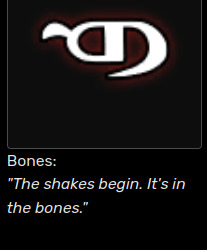

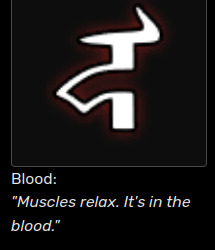

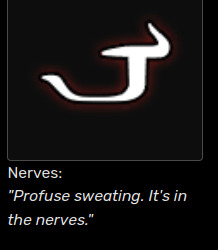

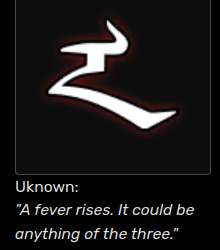
while the in-game words for Blood, Bones and Nerves are mongolian directly, it is interesting to note that their glyphs do not have a phonetic affiliation to the words (ex. the "Yas" layer of Bones having for glyph the equivalent of the letter F, the "Medrel" layer of Nerves having a glyph the equivalent of the letter È,...)
the leatherworks on the Kayura models', with their uses of angles and extending lines, remind me of the Phags Pa Script (used for Tibetan, Mongolian, Chineses, Uyghur language, and others)
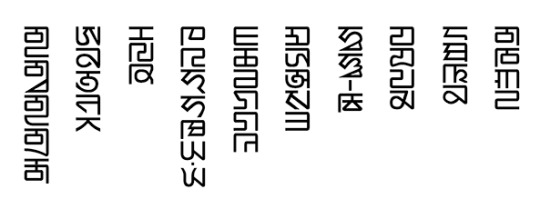

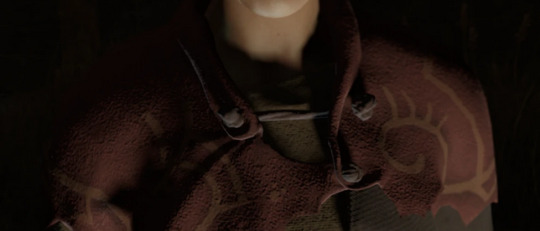
some of the sigils also look either in part or fully inspired by Phags Pa script letters...



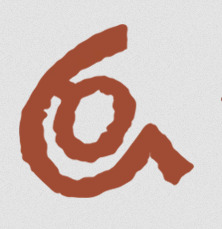


some look closer to the mongolian or vagindra (buryat) script

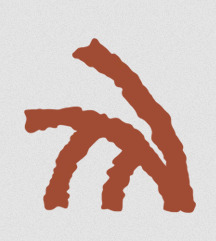
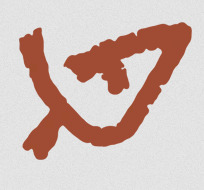

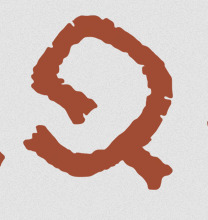
looking at the Herb Brides & their concept art, we can see bodypainting that looks like vertical buryat or mongolian script (oh hi (crossed out: Mark) Phags Pa script):
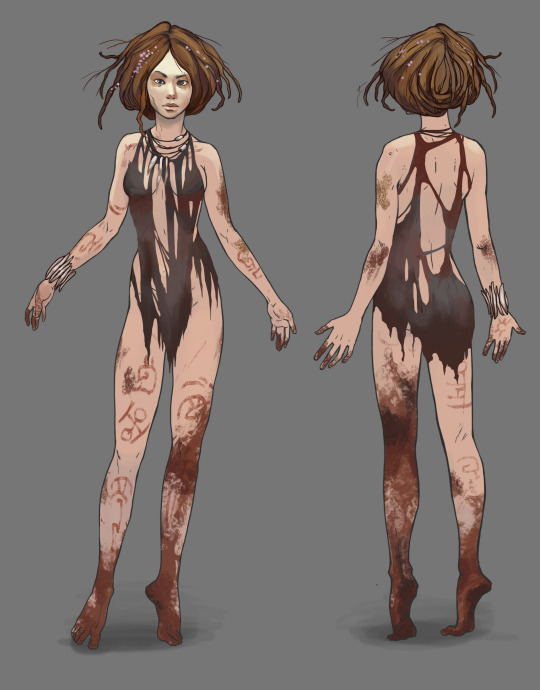
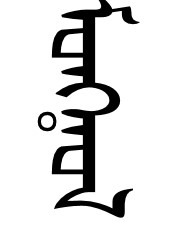
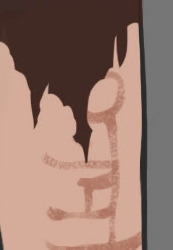
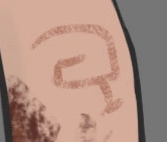

shaped and reshaped...
#i brought it up in the gc because it was my impression and i wanted to check in with people who have been here longer than me + are also#more impacted than me but i've always seen the discussion around the Kin to be like ''yeah [x] is obvi inspired by [ethnicity]; [y] is#obviously inspired by [ethnicity]; but [z] is hogwash hodgepodge and [ethnicity] doesn't do that and [a] is hogwash hodgepodge [...]''#like i will not lie to you. i have not seen an indigenous person in this fandom truly believe that the Kin is in any way respectful/careful#to any culture it is inspired by. but then again 1) love to hear dissident opinions; that's what Discussion is for and 2) maybe i just#haven't looked far enough! that's perfectly possible!#i've seen (& continue seeing) people recognize and appreciate the bits and pieces of the Kin that Do have obvious correlations [the Buryat#belief of the Earth needn't be cut+needing ask for permission to dig; the Trials of p1 which i've seen native american people relate to;...#but like. ''yeah it's careful/respectful'' has never been a sentence i ever come across about the Kin. won't lie.#like for every post i read about how the Kin is a respectful homage to [ethnicity] i read 2 to 4 abt how it's a disrespectful sexualizing#hodgepodge of (sometimes unrelated) sets of beliefs and mores that the game both wants you to interact with as a narratively-understood#racism problem in-game & Also is racist itself and lacks so many distinctive qualities of [ethnicity] to the point it feels just like ''one#of them fantasy ethnicities white authors make for their YA novels that are SWANA-inspired but they won't fucking bother doing their#research on which one they want to appropriate'' - GC message [permission to share]#like i am but the messenger on this [because again. not CA indigenous. but i know people who are and i read things by people who are#and i've run this reblog through people who are etc] but most of the discussion around the Kin does Naht go in the sense of#''it's a careful and interesting [way of handling the Buryats/Mongols/...]''. most people i've read talk about it#are somewhat pissed lol. which again. it's perfectly normallll to have dissident opinions. in the Perspective game.#tldr; imaginary and imagined people with obvious and very clear inspirations but in the blurry edges in the ''imagination'' & ''invention''#lies some disturbing racist/misogynistic/appropriative shit; which lead writer D.; even if half-chinese or 1/16 Han or Manchu*;#[ETA: 1/16 was right] still can fuck it up big big time.#also considering his Allegations towards women and girls everyone can side-eye his treatment of the Herb Brides; regardless of if we think#that's a ''respectful'' invention based on RL ethnicities#neigh (blabbers)#anyways. genuinely good discussions to have and partake in; even if it's obviously different visions on the matter.#i'm also really attached to like. creating fantasy ethnicities for storytelling but like all storytellers you haaaaave you have to do your#research to handle the ethnicities you're ''basing yourself on'' properly.#the whole argument here [which other people have more eloquantly/personally described than I] is that the Kin is both different enough#from its inspirations [completely different dress; different spiritual castes and practices; a religion that is almost the complete inverse#of buryat tengrism; the herb brides; the worms;...] but also Similar Enough that we have to consider like. both parts of the equation
301 notes
·
View notes
Text
Why demigods have certain powers: a theory (long post)
I have this theory that the reason demigods have specific strengths, or display one aspect of their parents powers over others is due in large part to what aspect their godly parent visited their mortal parent in AND how their mortal parent perceived them. TLDR at the end. Idk if this is a common theory, but I’ve never seen it written out before.
Half of this is pretty much so canon, in the way we know that Greek vs Roman demigods are different because they aren’t the same exact gods. The best example of this is Nico vs Hazel, where Nico is a child of Hades, who is the god if the Dead where Hazel is a child of Pluto, the god of the Underworld and Wealth. This affects their powers. We will come back to them.
However, we also know that demigods don’t necessarily inherit all of their parents dominions. For example, Will, Kayla, and Austin are all children of Apollo, but each have very different specialties. Will has power over healing and light, Kayla over archery, and Austin over music. Apollo is god of all three, but they all have very defined areas of interest and talent.
I think what powers come to a demigod naturally will be determined by their mortal parent, not their godly parent. The best example of this is Hazel.
Marie Levesque very specifically summoned Pluto because he was a god of wealth. It’s how she perceived him, not as a god of the underworld, the dead, or shadows, but as a god if riches and jewels. This explains why Hazel’s abilities are focused on riches. (I’m aware Pluto grants Marie a wish, and that part of that is that Hazels jewels are all cursed. However. Even after they stop being cursed (kind of) at the end of SoN she doesn’t lose the ability to summon them. SHE is the gift Pluto granted Marie, not the gems themselves) This doesn’t mean that she can’t access other abilities associated with children of Pluto/Hades, as is obvious in HoH when she assists Nico in shadow traveling everyone out of the House of Hades, or that the dead don’t sense her as a child of the Underworld and defer to her, like the Leres at CJ, but that isn’t how her powers naturally manifest.
Sticking with Hades, Nico (and Bianca) are a good comparison: they have (kind of) the same father as Hazel, but their abilities are very different. Looking at Maria, we don’t know too much, but I am going to assume something based on the fact that she’s from Italy in the 30s and her name is Maria: she was probably Catholic. Now, as someone who was raised Catholic, I feel qualified to say that Catholics are, while not as a whole superstitious, they are quite obsessed with death. Not in a Rapture sort of way the way some denominations are but more in a…they care A LOT about the Saints and Heaven and judgement, and because of that they’re more than willing to accept things happening because of intercession of a Saint or a dead loved one guiding them. I am not Italian in the 30s, so I can’t speak to that. But because of that, and the fact we KNOW that Maria knew the father of her children was Hades, Lord of the Dead (he offered to keep her safe in the Underworld, she knew about the prophecy, she knew Zeus wanted her dead) we can see how these things about her are reflected in her children.
Nico is known as the Ghost King, because his powers mostly manifest in his ability to summon and control the dead. He also has powers related to shadows, but he really has to practice to get good at it and not pass out. Affecting the dead is the first thing we see him do as a Hades power (dismissing the skeletons attacking Percy at the end of TC, and again all through BotL with Minos) before we ever see him shadow travel, which isn’t introduced until tLO, two books after his introduction. While Bianca’s page time is limited, the only real Hades power we see her demonstrate is when she destroys the skeleton. Maria saw Hades as the king of the dead more than any of his other powers. She obviously RECOGNIZED he had dominion over darkness and shadows (she says so when she tells him she won’t raise her children in the darkness of the Underworld) but that isn’t the part of him that she sees and values and fell in love with. She had kids with the god of the dead, so her children primarily manifest their powers over that domain. I also think that the fact she knew she was dating a god made her children more powerful, if that makes sense. Nico and Hazel are some of the most powerful demigods in the series, even apart from being big three kids.
But Mags, Mags! I hear you cry, what about kids like Annabeth? Athena kids don’t have obvious powers, how is that relevant here?
There aren’t a ton of good comparisons for Annabeth to see how her abilities compare to her siblings besides maybe Malcolm. However, I’ll do my best.
Annabeth’s power from Athena is her intellect and her cunning. Let’s look at how Athena and Fred met: Annabeth tells us that without Athena’s help, he wouldn’t have graduated his doctoral program. So when Fred met, we can assume he met Athena in her aspect of being a scholar. We know is that this is not Athena’s only mythic role, she is also a strategist and a patroness of useful crafts like weaving among other things.
I believe that Annabeth’s intellect really does manifest more as a scholar than anything else. For example, she has no formal schooling between the ages of 7 and 12, when she is at camp full time. Those are some formative years when a child creates a foundation for their future learning, and Annabeth has ADHD and dyslexia. School should not be a walk in the park for her. And yet, she doesn’t really struggle to reenter school, and she’s constantly referenced as doing essentially independent studying, whether it’s reading books in Ancient Greek or working on Daedalus’s laptop. Studying and researching is her hobby because it comes incredibly naturally to her, which matches up with how Fred would have seen Athena. And yes, we see her weave to get across the cavern in MoA, but that’s kind of a one off. Annabeth herself realizes in the moment that, “oh yeah, Athena’s the goddess of useful crafts,” like it’s never occurred to her to even attempt such a thing before. The only time we see her bring this talent back is at the beginning of BoO when Jason is stabbed (iirc - I could be wrong on this reference. I didn’t open a single book to write this essay)
Comparing that to Malcolm, we don’t know a ton about his powers or his parent. All I can recall is a single short story in which Athena sends him a dream requesting he reinstate a festival of hers, and he leads the Athena cabin in setting everything up, and I think weaves the Athena Parthenos a cool robe? Fact check me here, that’s as memory serves.
So why wouldn’t Athena ask Annabeth to do that? She’s the one who found the statue after all. I’m willing to bet it’s because whomever Malcolm’s father is, he met Athena in her aspect as a craftswoman. The skills that Malcolm inherited are primarily to do with crafting because of his mortal parent.
You can also see why some aspects of gods aren’t really seen in their children. For example, Dionysus is a god of wine but also notably mania. Of his two children we see + the one child of Bacchus we see, (Castor, Pollux, and Dakota) all three only have affinities towards the former. (There are vague allusions to the twins assisting the Demeter cabin with the strawberries because fruit bearing plants do well with them, although grapes are best, and Dakota has his kool aid addiction) but none ever display an ability to induce mania. Dionysus does, in TC when Percy Iris Messages him, but his kids don’t. Why? I’m willing to bet that less people are attracted to the manic aspect of Dionysus than the party side, especially because it requires wanting to make a baby with the guy. Not everyone, I’m sure at some point there’s been a Dionysus demigod who could, but it’s be rarer.
So what about Percy? He has like ALL his dad’s powers. Eh - kind of? Walk with me here:
We know quite a bit about Sally and Poseidons relationship, that they were together for an entire summer, that they met at Montauk, and that Sally knew she was dating the King of the Ocean. (Poseidon also offers her a palace under the sea to keep her safe from Zeus. Now he’s 2/2 on having his brothers offering to keep their lovers safe from him and thus revealing their identities to them and making their kids even more powerful)
We know that she associates Poseidon with the sea very strongly, but more so that she thinks he is powerful but GENTLE. I posit that because of that, it explains why water is healing to Percy. Zeus kids don’t get magically better when they stick a finger in an outlet. Demeter kids aren’t healed by plants. This is kind of unique to Percy and I think it’s because of Sally and Poseidon’s relationship. I would also assume that at some point, Poseidon showed her that he could communicate with sea life and horses, and those then became part of her idea of him, which is why water, equestrians, and fish are the parts of Percy’s power that comes most naturally.
You know what Poseidon’s the god of that isn’t in Percy’s primary powered? Earthquakes. He’s done it once: Mt St Helen’s in BotL and he did so while he was actively dying and the mountain was already erupting a little bit, he just made it worse. But he’s never actively tried to do so. It feels kind of like Hazels shadow travel: he probably could, with a lot of effort and maybe some help because his dad IS Poseidon, but it’s not his thing.
It’s also why he can kind of mess with ice. The only real time we see him do so is in SoN when he collapses the glacier CJ in Alaska, but for the most part, if water isn’t in its liquid form, he doesn’t really mess with it. No steam either. He probably COULD, but Sally met Poseidon by an ocean, so that’s their basis.
The poison in HoH reads similar to the earthquake. He probably could control any water based liquid but it would take more effort and he doesn’t want to. For what it’s worth, yes, Percy could blood bend, easier than he could poison bend because blood is salt water. But he won’t. Because it disturbed him.
Moving on.
Mags! That’s all well and good, but what about Thalia and Jason? Don’t they kind of disprove your theory? They have the exact same mortal parent, why do they have such different powers?
Well, for what it’s worth, they DON’T have the exact same parents. Zeus and Jupiter are not the same god. So they’re technically half siblings through Beryl. Swerve. But I see your point - if I’m suggesting that the powers one inherits from their godly parent are determined by one’s mortal parent, then Thalia and Jason should be basically the same.
Well, they are pretty similar, all things considered, but a key part of that is what there really is to inherit from their godly parent. This gets more into classical theory that I am not an expert in, but from my understanding: you can generally state that of the two, Zeus was more impulsive and wrathful and might smite you for anything, and Jupiter filled the father/king of the gods role more. And we already agreed at the bringing with Nico and Hazel that Roman and Greek gods aren’t the same.
And. When we’re looking at the relationship between Beryl and Zeus, it’s a wild starlet having a wild fling, she has no children, she parties, she’s here and there and everywhere, she can’t be tied down. And it’s implied that she knew he was a god, because being able to catch the attention of Zeus apparently made her go off the deep end when he left. And she wanted very badly to see Olympus but Zeus refused (with good reason. The reason being Hera) Thus, Thalia’s powers pick from the ones matching those traits. She’s got power over lightning, but not necessarily the sky. She probably could fly if she ever tried. And also: she doesn’t have to ask permission to call down lightning. She just does. She makes her own lightning.
Jason on the other hand, is the result of Beryl and Jupiter. The relationship was a smidge more stable. Beryl was calmer when Jupiter was around and Jupiter presented himself to her in a more…grand? aspect. It makes sense then that Jason can fly but he’s not really a lightning guy. Like. Yes. He caaaan, but pretty much so any time it counts there’s a mention that he like, petitions his dad to let him summon a bolt. But he controls the winds with ease, because Jupiter is a king, and that’s how he presented himself to Beryl.
Which brings me to a straight up theory I have about May Castellan. I think that she was either a politician or a political correspondent. Someone who was on the news a lot, someone with a sharp tongue, an excellent debtor, and an orator extraordinaire. All we know about her in canon is that she had Luke, and she was special enough to Hermes that he continued to visit her after Luke was born, and that he told her about the Oracle, and how that turned out.
Hermes is the god of a metric ton of stuff. Thieves, travelers, tricksters, merchants, athletes, gymnasiums, orators, communication, gambling, the list goes on. A lot of his kids are described as speedy: their mortal parents probably caught his eye due to being athletes. We know Luke to be very charismatic and the best swordsman the camp had seen in years. I think that indicates that May attracted Hermes as someone with a sharp wit, who could verbally spar anyone into submission (unless she was legit into swordplay) and she caught peoples attention and could convince them of anything. It also explains why she’d have been so insistent on becoming Oracle, besides being clear sighted. If she was an elected official or a media correspondent, it would suggest an interest in conveying messages, and being the voice for others, like being the voice of Delphi.
But Mags, that’s all well and good but Will’s mom is a musician. Why is his only gift on that front that horrible dog whistle?
Eh…? This one is tricky, however, it might be that she attracted Apollo because of her music, but he attracted her because he exudes warmth and light, thus her child gained healing and light powers and not music. It’s a weaker explanation. Sorry.
There is one other very notable exception to this theory, and I do have an answer to that. Leo’s fire ability had very little to do with Esperanza, and everything to do with the prophecy.
I think that Leo was fated to have power over fire, as the fire in “to storm or fire the world must fall.” That being said, I don’t think Leo’s crafting skills were fated. Those I feel were passed down from Hephaestus through Esperanza’s association with engineering and crafting with him, but the fire wasn’t. The fates wove that power in.
TLDR: Which powers a demigod inherits from their godly parent isn’t random, it’s determined by how their mortal parent perceived the god and their domains.
#Percy Jackson#pjo#pjo hoo toa#pjo theory#hazel levesque#nico di angelo#annabeth chase#malcolm pace#thalia grace#jason grace#may castellan#sally jackson#frederick chase#marie levesque#maria diangelo#luke castellan#beryl grace#will solace#naomi solace#leo valdez#esperanza valdez
169 notes
·
View notes
Text
This is for some more handy visuals references for art if you want to draw Greek myth characters in general, or Trojan war (specifically the Achaeans especially) characters in specific, in Mycenaean-era clothing! I found a couple more things, and might repeat some old - mostly focused on women, but perhaps not only.
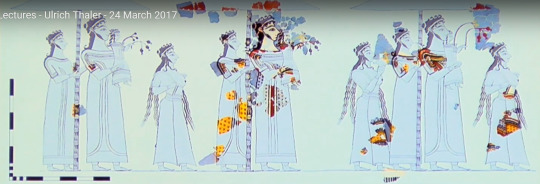
This picture is my new best friend, honestly, aside from the fragmentary fresco of women in chariots. Look at the large parasols! It's both a good (partially reconstructed) view of the "simple" long tunics without layered skirts and whatnot, and a view of those skirts. I like how it's very clear here that even the simpler tunics can have a lot of patterns. In comparison, here's how the simpler ones look (though even they can have some patterns):

This one also shows you the bottom half of the composite version of this fresco (with the blue and pink tunics).


These two I like for a potential look at how children were dressed. The first is, obviously, a doll, not a child, but still. The girl in the second is wearing the more complicated getup, however. (I am assuming she is a real human girl child anyway, since she's actually on the ground level compared to the small figures being carried with the women. Those I'm vaguely wondering if they aren't effigies/deity statues?? They're so much more decorated than anyone else.)
Also a very fragmentary view of the bottom of men's shorter tunics!
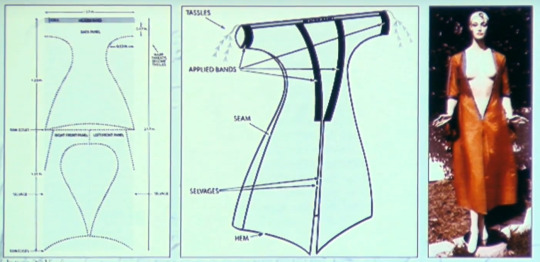
This is only one suggested reconstruction of this type of open-chested tunic, since I've seen other suggestions that are closed down the front below where the open front closes up. (As well as as that this open-fronted thing is actually a short jacket/bolero, and not a full tunic-dress.


Something for the men; the second one is definitely at least partially armour. Armour-related art is also the only place I've seen anything that has the men in something like fringe-ended tunic/wrap around thing (if it is that). And I'm really interested in how I've never seen any fragments of men wearing red. Blue, yellow/saffron, white (undyed linen/wool probably?) is seen most often.
162 notes
·
View notes
Text
The flaws of Jax and Ragatha, and why they matter to Pomni's character arc.
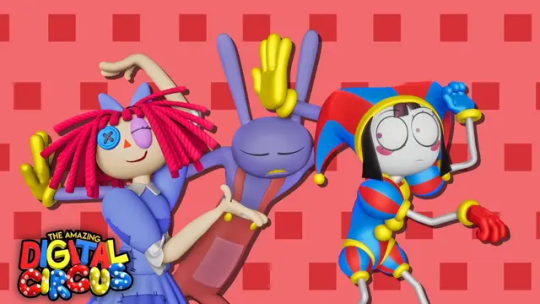
Within the two episodes of The Amazing Digital Circus that have been released so far as of writing this post, there have been two characters who have been given the most attention and depth out of any of the cast (ignoring Pomni obviously), and those two characters are Ragatha and Jax.
The duo consisting of the kindhearted optimist and the meanspirited pessimist have without a doubt become some of the most interesting characters to analyze within this series so far thanks to how much meaningful screentime and character depth they have been given within the the two episodes that we viewers have been fortunate enough to witness with our very eyes.
But why is this? Why is it that these two have received special attention from the writers so far, and what role do they play in Pomni's character journey? Well I believe I may have found the answer, and it's unfortunately one that does not spell a good future for these characters. But to truly understand where I am coming from, we must first understand who these two characters are and how they relate to our main protagonist.
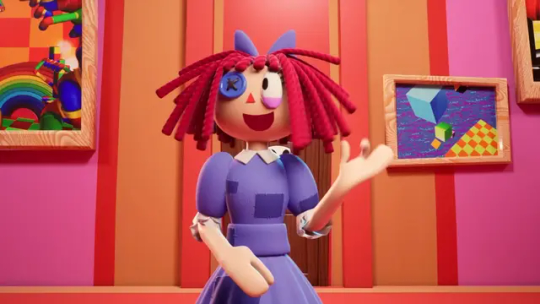
To start off with the kindest of the duo, we have already learned quite a lot about Ragatha thanks to the two episodes she has been featured in so far.
Her most prominent character trait is without a doubt her kindness. She is the first person to really be genuinely nice to Pomni upon her entrance to the circus and spends the rest of the episode showing her around the place and trying her best to help her get settled in.
She's also someone who doesn't like to be overly blunt with her responses, such is shown when Pomni asks how they leave the circus, to which Ragatha, instead of just saying that she couldn't, phrases it in a way that makes it sound as if they simply haven't found a way to leave yet, this was obviously done in an attempt to not freak Pomni out too much, though this doesn't really go anywhere thanks to Jax.
Now that's great and all, Ragatha's a nice person, you can easily observe that through casual watches of the show, looking deeper however, you can see that there is a lot more going on with Ragatha than she would like to make you believe.
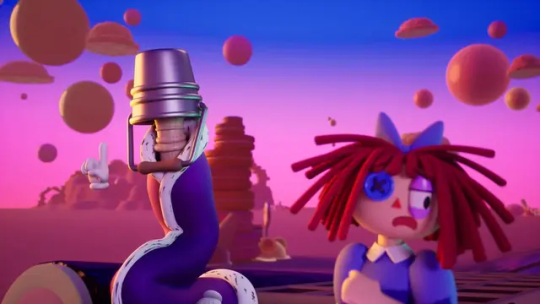
Insecurity is another trait that Ragatha has that, while not shown off as prominently as her optimism, is still very important to Ragatha's character.
As we see in episode 2 of the series, one of Ragatha's biggest fears is not being liked. She vents to Kinger about how she feels like Pomni doesn't really like her that much, and that clearly scares her. And why wouldn't it? The end of episode 2 makes it clear that one of the most important things in this show when it comes to keeping the main cast mentally stable, is their sense of community.
They're all in this together, they have each other's backs and will do their best to be there for each other when it's needed. That is what is communicated to us within the second episode through Kaufmo's funeral.
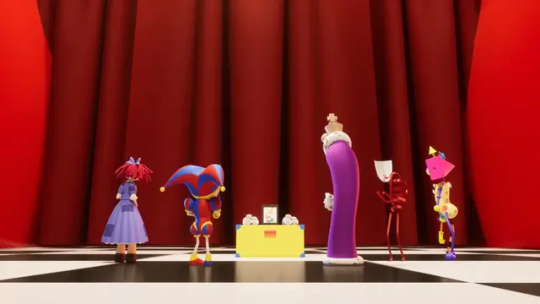
This segment of the episode, while somber in its tone, is also one that instills hope within Pomni and the viewer. Because it shows that despite everything, the circus members do care about each other. That abstraction is something that affects everyone and it isn't something that is just brushed off immediately, which if you recall, was the crux of Pomni's fears as seen at the beginning of the second episode, the fear of being forgotten, the fear of no one caring.
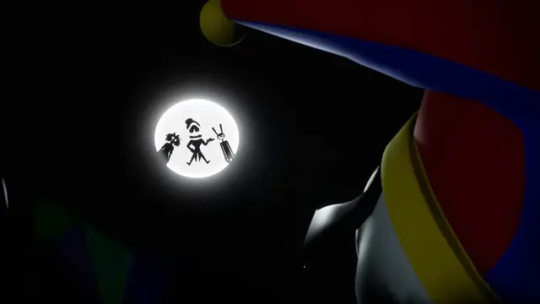
"I don't even remember her name honestly" - Dream Jax.
So with how the importance of community has been firmly established within this show's messaging at this point, it should be no surprise that Ragatha's biggest fear is not having that community. Of people not liking you, of people hating you. So how does Ragatha solve this?
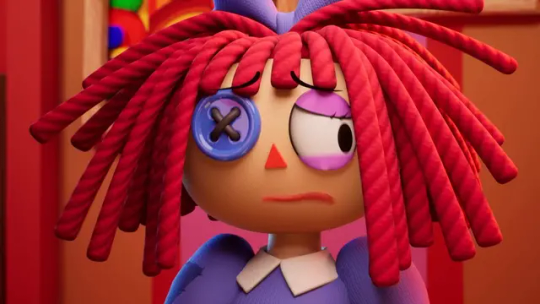
Repression, that's how. Of all of Ragatha's personality traits her tendency to not display her true feelings towards things are without a doubt the most damaging.
The best example of this is how she reacts to Pomni abandoning her for the exit. The pilot would lead you to believe that she was mad at Pomni for doing this, that she didn't trust her anymore because of this selfish act.
And yet, that's all brushed to the side in the following episode. Ragatha is back to her optimistic self and is saying that everything is fine! That it was completely understandable and that there was no bad blood between them. Yet you can tell that isn't the whole truth, that Ragatha really didn't get over what Pomni had done to her that easily.
Now do I think Ragatha hates Pomni or secretly resents her? No, not really. I do think she's being honest when she says that she doesn't hold anything against her for doing this. But that doesn't mean she wasn't hurt by it. We can see clear as day from the pilot that this did affect her, so why does she act like she doesn't?
Because, from her perspective, her feelings do not matter. The only thing that does is to make sure Pomni is able to adjust, to make sure that everyone is happy, that everyone is still somewhat sane within the circus, and so she compromises her emotions in order to do this. Gooseworx has even said it herself that Ragatha often says things she doesn't necessarily mean in order to ease tensions. She doesn't want to cause conflict, she doesn't want people to fight with each other because she understands how important community is to the members of the circus persisting.
Yet in the midst of all of this, what Ragatha fails to realize is that with how she currently handles things, she is paving the way for her own mental break.

Ragatha, in her attempts to be there for others, has walled herself off from others being there for her. By lying about how she really feels about things, by acting as if she is fine, she is not allowing herself the emotional vulnerability necessary for others to be there for her when she needs it.
The closest thing we have had to this so far is with Kinger, and while having someone she feels comfortable enough to lament her feelings around is a good thing, this is one person, one person who is... not exactly mentally stable, to put it lightly. Is not exactly an end all be all solution to her problems.
Kinger being the only person who Ragatha can rely on is only gonna work for a limited amount of time, the more she represses, the more she hides her true emotions and clear mental instability, the closer she is to meeting a cruel fate, one that no one would be able to save her from because no one even realized there was something wrong with her. For in her pursuit to make everyone else happy, she has sacrificed her own happiness, as a result.
And then there's Jax.
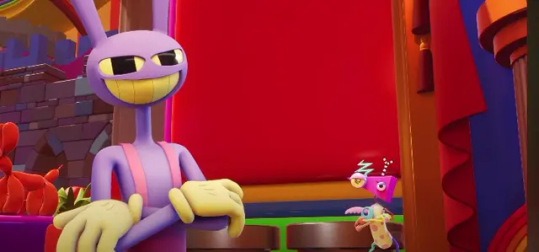
Jax, in a lot of ways, is pretty much the polar opposite of Ragatha. While her leading trait is kindness, Jax's leading trait is being a complete and utter asshole. And while Ragatha is all about answering things in a roundabout way to ease stress, Jax is all about the blunt answers.
This is best shown to us in the pilot when, in the same scene where Ragatha tries to answer Pomni's question of "how do I leave?" in a way that wouldn't stress her out too heavily, Jax goes straight in with the "you can't". Jax is a pessimist, he has accepted that there is no way out, and is simply riding things as they go by.
Jax's leading character trait is all about causing as much chaos as he can for the sake of his own satisfaction. He doesn't care about how others feel, the only thing he cares about is causing as much chaos as possible simply because he can.
Yet that isn't all that's going on with Jax, there's something deeper here, something more complex.
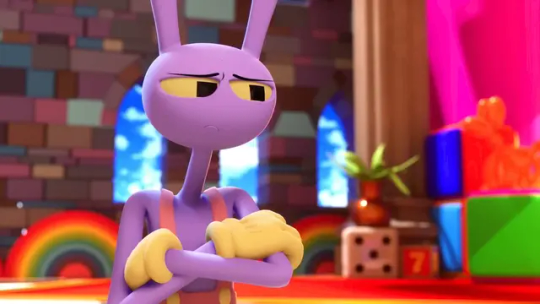
When it comes to the scenes everyone points to when saying that Jax has a lot more going on with him than meets the eye, the scene where he reacts to Kaufmo's funeral is the one everyone looks at with an analytical lens, and that's for a good reason.
For I think this little scene might just tell us a lot more about Jax than we think.
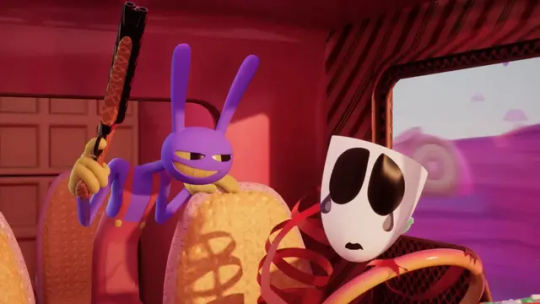
One thing that I've come to notice about Jax's brand of chaos is that it's very reliant on others' reactions. All of the chaos he causes, all of the absurd and awful things he does are for the sake of seeing how others react. From throwing Pomni over the side of a truck and attempting to use her as a human bridge, or literally everything that he does to Gangle, it's all reaction-based, and that made me realize that, despite how selfish and uncaring he acts towards everyone else, community is still the one thing that truly matters most.
He needs the others so that they can react to his hijinx, as they are what give said actions meaning. If he had no crowd to watch as he acts like a shitty person, then he has no reason to do anything. But that is also where Jax's true character flaw comes in, his selfishness.
With how Jax is constantly pushing others around for the sake of his own amusement, Jax is very clearly a self-centered person. He is someone who is in it for himself and no one else. Who cares if others don't like him? Who cares if others despise him? As long as he gets to see funny things happen to people, he is gonna be okay.
But what happens when that method is no longer effective? What happens when the others don't give him the reaction he wants? What happens when he can no longer use chaos as a way to distract from the pointlessness of his reality?
Well, as scary as this may be to think about, Jax won't really have much of anything to fall back on. His cruel actions have wrote him into a corner. No one likes him, that much is obvious. And while Jax seems content with this now? What happens when he is put in the position of needing someone else's help?
Well, then he'll have no one, and it's ironically for the exact opposite reason to Ragatha. Ragatha's problem is that she is constantly repressing her emotions, despite the fact that she has people who care about her, she doesn't open up to them because in her eyes, her feelings are secondary to others'.
Yet Jax is the opposite, he's honest, he is self-centered, and that's also why he is one of the members who are in this most danger.
In a show that seems to be about how important community is and how important it is to stay together and be there for each other? To have a character who is the complete opposite of that. To have someone who doesn't care about others, who won't be there when someone else is hurting. To have someone who is actively making things harder for everyone... that just spells out demise.
Jax's true weakness is that he does not have a community who will be there for him when he needs it, he was never there for others so why should they be there for him? Meaning that when Jax is at the end of his rope, crying out for help, no one will listen, because as cruel as it sounds, most of the members would probably be happy that he's gone.
While this does admittedly rely a bit on speculation, I think what I've stated above might be the true reason for why Jax looked sad for a moment when the other characters were talking about the funerals held for those who have abstracted. Because in that small moment, he realizes he might not get a funeral of his own when he "dies", or if he did, no one would really have anything nice to say about him.
And that fear, that knowing of how the way you've built yourself up by putting others down has lead to everyone hating you, to everyone not having a single good thing to say about you... that is terrifying. And yet he hides it, he walks away, he refuses to attend the funeral because then he will have to be confronted with the uncomfortable reality of the fact that he won't die as someone who was remembered for doing good things.
The only thing he'll be remembered for, is how much everyone hated him. And all of that brings us right back, to Pomni.
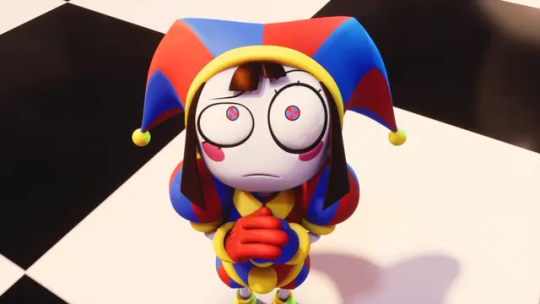
I said at the beginning of this post, as well as with the title itself, that Ragatha and Jax matter to Pomni's character arc, but why is this? Sure they're both main characters so obviously they're going to influence her journey going forward, but how exactly does any of this matter to Pomni? It's simple really.
Ragatha and Jax represent two extremes, they represent what happens when you lean too far in one direction. In one case, it is caring too much about others and not caring about yourself, and in the other, it's caring too much about yoursef and not caring about others.
Pomni has already shown traits of both Jax and Ragatha. She has shown an empathetic, kindhearted side as seen in her interactions with Gummigoo, and she has shown a selfish side, as seen when she abandoned Ragatha for the "exit" in the pilot.
Pomni has shown herself to be both selfish and selfless. But what part of her matters more? Simple answer, both. It is important to care about others while also taking time to take care of yourself. Ragatha and Jax show what happens when you forget to do one of these things.
By always taking care of others, you're forgetting to take care of yourself, and by always taking care of yourself, you fail to take care of others. To find a healthy balance is to do both. To be aware of your own mental health while also making sure that others are doing okay too. And this is something that Pomni will need to realize if she is going to make it in the circus.
And this is where Jax and Ragatha become important. I believe these two will show Pomni how important it is to keep a balance of things. To not lean too far in one direction, as if you do, it spells bad news for you either way. And how will this be communicated to her and the audience?
Abstraction.
Think about it. If Ragatha and Jax's harmful practices continue without change and they end up abstracing because of it, that will be a wakeup call to Pomni, it will show her the flaws of being too selfless, and too selfish. Is it an extreme way to communicate such message? Sure, but it's also one that can't be ignored.
We, the audience, and Pomni, would see first hand the consequences of leaning too far in either direction, that if you don't find a balance, you will end up like Jax and Ragatha did.
And that's why I think these two in particular have been given so much screentime and attention these past two episodes. Because they are meant to show us the most extreme versions of Pomni's most prominent character traits.
The ability to care about yourself, and the ability to care about others.
Of course, I might be wrong in this assessment. We are far too early in the show's runtime to truly predict any big events like this. But from a narrative standpoint, I believe this interpretation makes the most sense in the way of showing us the audience, and Pomni, what truly matters. It's not just about you, it's not just about others, it's about both.
Thank you for reading.
339 notes
·
View notes
Text
i just rewatched ‘the woman who fell to earth’ a couple of days ago for the first time since it aired back in 2018 and the more i think about it, the more i like it.
thirteen is the only doctor for whom i feel a tangible, rose-tinted nostalgia. she wasn’t my first doctor, but she was the first doctor i watched live, the first doctor that i spent an actual extended period of time with over the episode rollout. her intro episode has middling parts (as can be expected with most episodes of Who) but there’s also so much good that i really want to highlight.
first of all, there are some really great character dynamics set up here. much more interesting than i remember, tbh. ryan is a guy who loves mechanics but is stuck in a warehouse job he hates, a guy who obviously wants to connect to people, a guy who by the end of the episode has lost both his mother and grandmother in the space of a couple of years and the step-grandfather he didn’t really want is all he has left (minus his absent father). that’s interesting.
yaz has a keen sense of justice and this raw, intense yearning to help people, to do something worthwhile, something more - the way she has chosen to express that is through law enforcement, but it’s not quite giving her the satisfaction she wants. that’s interesting.
graham’s experience with cancer means that he constantly feels like he’s living on borrowed time. meeting grace gave him purpose, gave him family, gave him the will to fight when he fought it was all but over, but now grace is gone. he and ryan aren’t related, but they’re family, and now they’ve got to figure out how to care for each other without the very lynchpin that brought them together. once again with feeling: interesting!
“i’m just a traveller. sometimes i see things that need fixing. i do what i can.” i like that they circle back to the ‘just some guy’ portrayal of the doctor here, both because it’s the one i’m partial to and because it feeds particularly well into the whole ‘the doctor is an unreliable narrator’ aspect, especially in the wake of the increased deification in the moffat era. it's a nice set up, even if it gets completely overhauled circa series 12/13. in fact, having thirteen keep this as a persistent attitude throughout the Timeless Child of it all could have been really effective re: her reticence with her companions and refusal to address or deal with her past.
the scene where thirteen builds her sonic screwdriver might be one of my favourite sequences in nuwho. i love that it’s a hybrid of alien tech and sheffield steel. i also love that they highlight the ‘mad inventor’ side of the doctor here (her teleportation circuit is based around a microwave?) and wish that they had carried it forward more. it would have been the perfect basis for her to bond with ryan over. jodie also pulls off the humour of the episode well, considering the significant shift from moffat dialogue.
i enjoy thirteen's outfit: the vibrancy of it as mirroring her childish excitability, but also as another part of the mask - if i dress all colourful then maybe i can ignore/outrun/masquerade my great capacity for darkness! etc etc. the shopping trip with yaz and ryan is a bit shoe-horned in at the end but it's cute that she finds it in a charity shop. (back in 2018 i bought a t-shirt with a couple of stripes across the chest solely because it remotely resembled the one she wore lol. nerd from a young age, me.) jodie also looks soo hot in capaldi's outfit though so a spin on the traditional suit would also have been appreciated.
some miscellaneous points: i like that she tells Karl off (“you had no right to do that”) right after saving him. i like that she gets it wrong at first and makes it clear that she’s working on the fly. she’s following her instinct, and that instinct is to help people. doctor who has been beautiful before but the cinematography takes such a huge step this era. “it’s been a long time since i bought women’s clothes” i am choosing to believe this is about river thank you and good night.

#if you read all of this you are so brave and also i love you#accidental essay#'potential' is the chibnall era in one word tbh#excuse inaccurate comparisons i do not remember enough about this era and what they carry forward#thirteen#thirteenth doctor#doctor who#the woman who fell to earth#ryan sinclair#yasmin khan#graham o'brien
261 notes
·
View notes
Text
WoT Meta: Feudalism, Class, And The Politics of The Wheel of Time
One of my long standing personal annoyances with the fantasy genre is that it often falls into the trap of simplifying feudal class systems, stripping out the interesting parts and the nuance to make something that’s either a lot more cardboard cut-out, or has our modern ideas about class imposed onto it.
Ironically the principal exception is also the series that set the bar for me. As is so often the case, Robert Jordan’s Wheel of Time is unique in how much it works to understand and convey a realistic approach to power, politics, government, rulership, and the world in general–colored neither by cynicism or idealism. How Jordan works the feudal system into his world building is no exception–weaving in the weaknesses, the strengths, and the banal realities of what it means to have a Lord or Lady, a sovereign Queen or King, and to exist in a state held together by interpersonal relationships between them–while still conveying themes and ideas that are, at their heart, relevant to our modern world.
So, I thought I’d talk a little bit about how he does that.
Defining the Structure
First, since we’re talking about feudal class systems, let's define what that means– what classes actually existed, how they related to each other, and how that is represented in Jordan’s world.
But before that, a quick disclaimer. To avoid getting too deep into the historical weeds, I am going to be making some pretty wide generalizations. The phrases ‘most often’, ‘usually’, and ‘in general’ are going to be doing a lot of heavy lifting. While the strata I’m describing is broadly true across the majority medieval and early Renaissance feudal states these things were obviously heavily influenced by the culture, religion, geography, and economics of their country–all of which varied widely and could shift dramatically over a surprisingly small amount of time (sometimes less than a single generation). Almost nothing I am going to say is universally applicable to all feudal states, but all states will have large swathes of it true for them, and it will be widely applicable. The other thing I would ask you to keep in mind is that a lot of our conceptions of class have been heavily changed by industrialization. It’s impossible to overstate how completely the steam engine altered the landscape of socio-politics the world over, in ways both good and bad. This is already one of those things that Jordan is incredibly good at remembering, and that most fantasy authors are very good at forgetting.
The disparity between your average medieval monarch’s standard of living and their peasants was pretty wide, but it was nothing compared to the distance between your average minimum wage worker and any billionaire; the monarch and the peasant had far more in common with each other than you or I do with Jeff Bezos or Mike Zuckerberg. The disparity between most people’s local country lord and their peasants was even smaller. It was only when the steam engine made the mass production of consumer goods possible that the wealth gap started to become a chasm–and that was in fact one of the forces that lead to the end of the feudal system and the collapse of many (though by no means all) of the ruling monarchies in Europe. I bring this up because the idea of a class system not predicated on the accumulation of capital seems pretty alien to our modern sensibilities, but it was the norm for most of history. Descent and birth mattered far more than the riches you could acquire–and the act of accumulating wealth was itself often seen as something vulgar and in many countries actively sinful. So with that in mind, what exactly were the classes of feudalism, and how do they connect to the Wheel of Time?
The Monarch and their immediate family unsurprisingly occupied the top of the societal pyramid (at least, in feudal states that had a monarch and royal family- which wasn’t all of them). The Monarch was head of the government and was responsible for administering the nation: collecting taxes, seeing them spent, enforcing law, defending the country’s borders and vassals in the event of war, etc. Contrary to popular belief, relatively few monarchs had absolute power during the medieval period. But how much power the monarch did have varied widely- some monarchs were little more than figureheads, others were able to centralize enough power on themselves to dictate the majority of state business- and that balance could shift back and forth over a single generation, or even a single reign depending on the competence of the monarch.
The royal family usually held power in relation to their monarch, but also at the monarch’s discretion. The more power a monarch had, the more likely they were to delegate it to trusted family members in order to aid with the administration of the realm. This was in both official and unofficial capacities: princes were often required to do military service as a right of passage, and to act as diplomats or officials, and princesses (especially those married into foreign powers) were often used as spies for their home state, or played roles in managing court affairs and business on behalf of the ruler.
Beneath the monarch and their family you get the noble aristocracy, and I could write a whole separate essay just on the delineations and strata within this group, but suffice to say the aristocracy covers individuals and families with a wide range of power and wealth. Again, starting from that country lord whose power and wealth in the grand scheme of things is not much bigger than his peasants, all the way to people as powerful, or sometimes more powerful, than the monarch.
Nobles in a feudal system ruled over sections of land (the size and quality usually related sharply to their power) setting taxes, enforcing laws, providing protection to the peasants, hearing petitions, etc. within their domains. These nobles were sometimes independent, but more often would swear fealty to more powerful nobles (or monarchs) in exchange for greater protection and membership in a nation state. Doing so meant agreeing to pay taxes, obey (and enforce) the laws of the kingdom, and to provide soldiers to their liege in the event of war. The amount of actual power and autonomy nobles had varied pretty widely, and the general rule of thumb is that the more powerful the monarch is, the less power and autonomy the nobles have, and vice versa. Nobles generally were expected to be well educated (or at least to be able to pretend they were) and usually provided the pool from which important government officials were drawn–generals, council members, envoys, etc–with some kingdoms having laws that prevented anyone not of noble descent from occupying these positions.
Beneath the nobles you get the wealthy financial class–major merchants, bankers, and the heads of large trade guilds. Those Marx referred to generally as the bourgeoisie because they either own means of production or manage capital. In a feudal system this class tended to have a good bit of soft power, since their fortunes could buy them access to circles of the powerful, but very little institutional power, since the accumulation and pursuit of riches, if anything, was seen to have negative moral worth. An underlying presumption of greediness was attached to this class, and with it the sense that they should be kept out of direct power.
That was possible, in part, because there weren't that many means of production to actually own, or that much capital to manage, in a pre-industrial society. Most goods were produced without the aid of equipment that required significant capital investment (a weaver owned their own loom, a blacksmith owned their own tools, etc), and most citizens did not have enough wealth to make use of banking services. This is the class of merchants who owned, but generally didn’t directly operate, multiple trading ships or caravans, guild leaders for craftsfolk who required large scale equipment to do their work (copper and iron foundries for the making of bells, for example), and bankers who mainly served the nobility and other wealthy individuals through the loaning and borrowing of money. This usually (but not always) represented the ceiling of what those not born aristocrats could achieve in society.
After that you get middling merchants, master craftsfolk and specialty artisans, in particular of luxury goods. Merchants in this class usually still directly manage their expeditions and operations, while the craftsfolk and artisans are those with specialty skill sets that can not be easily replicated without a lifetime of training. Master silversmiths, dressmakers, lacquer workers, hairdressers, and clockmakers are all found in this class. How much social clout individuals in this class have usually relates strongly to how much value is placed on their skill or product by their society (think how the Seanchan have an insatiable appetite for lacquer work and how Seanchan nobles make several Ebou Dari lacquer workers very rich) as well as the actual quality of the product. But even an unskilled artisan is still probably comfortable (as Thom says, even a bad clockmaker is still a wealthy man). Apprenticeships, where children are taught these crafts, are thus highly desired by those in lower classes,as it guaranteed at least some level of financial security in life.
Bellow that class you find minor merchants (single ship or wagon types), the owners of small businesses (inns, taverns, millers etc), some educated posts (clerks, scribes, accountants, tutors) and most craftsfolk (blacksmiths, carpenters, bootmakers, etc). These are people who can usually support themselves and their families through their own labor, or who, in the words of Jin Di, ‘work with their hands’. Most of those who occupy this class are found in cities and larger towns, where the flow of trade allows so many non-food producers to congregate and still (mostly) make ends meet. This is why there is only one inn, one miller, one blacksmith (with a single apprentice) in places like Emond’s Field: most smaller villages can not sustain more than a handful of non-food producers. This is also where you start to get the possibility of serious financial instability; in times of chaos it is people at this tier (and below) that are the first to be forced into poverty, flight, or other desperate actions to survive.
Finally, there is the group often collectively called ‘peasants’ (though that term is also sometimes used to mean anyone not noble born). Farmers, manual laborers, peddlers, fishers- anyone who is unlikely to be able to support more than themselves with their labor, and often had to depend on the combined labor of their spouse and families to get by. Servants also generally fit into this tier socially, but it’s important to understand that a servant in say, a palace, is going to be significantly better paid and respected than a maid in a merchant's house. This class is the largest, making up the majority of the population in a given country, and with a majority of its own number being food-producers specifically. Without the aid of the steam engine, most of a country’s populace needs to be producing food, and a great deal of it, in order to remain a functional nation. Most of the population as a result live in smaller spread out agrarian communities, loosely organized around single towns and villages. Since these communities will almost always lack access to certain goods or amenities (Emond’s Field has a bootmaker, but no candlemaker, for example) they depend on smalltime traders, called peddlers, to provide them with everyday things, who might travel from town to town with no more than a single wagon, or even just a large pack.
The only groups lower than peasants on the social hierarchy are beggars, the destitute, and (in societies that practice slavery) slaves. People who can not (or are not allowed to) support themselves, and instead must either eke out a day to day existence from scraps, or must be supported by others. Slaves can perform labor of any kind, but they are regarded legally as a means of production rather than a laborer, and the value is awarded to their owner instead.
It’s also worth noting that slavery has varied wildly across history in how exactly it was carried out and ran the gamut from the trans-Atlantic chattel slavery to more caste or punitive-based slavery systems where slaves could achieve freedom, social mobility, or even some degree of power within their societies. But those realities (as with servants) had more to do with who their owners were than the slave’s own merit, and the majority of slaves (who are almost always seen as less than a freedman even when they are doing the same work) were performing the same common labor as the ‘peasant’ class, and so viewed as inferior.
Viewing The Wheel of Time Through This Lens
So what does all this have to do with Robert Jordan’s Wheel of Time? A lot actually, especially compared to his contemporaries in fantasy writing. Whereas most fantasy taking place in feudal systems succumbs to the urge to simplify matters (sometimes as far down to their only being two classes, ‘peasant’ and ‘royalty’) Jordan much more closely models real feudalism in his world.
The majority of the nations we encounter are feudal monarchies, and a majority of each of their populations are agrarian farming communities overseen by a local lord or other official. How large a nation’s other classes are is directly tied to how prosperous the kingdom is, which is strongly connected to how much food and how many goods the kingdom can produce on the available land within it. This in turn, is tightly interdependent on how stable the kingdom is and how effective its government is.
Andor is the prime example: a very large, very prosperous kingdom, which is both self-sufficient in feeding itself via its large swathes of farmland (so much so that they can afford to feed Cairhien through selling their surplus almost certainly at next to no profit) and rich in mineral wealth from mines in the west. It is capable of supporting several fairly large cities even on its outskirts, as well as the very well-developed and cosmopolitan Caemlyn as its capital. This allows Andor to maintain a pretty robust class of educated workers, craftsfolk, artisans, etc, which in turn furthers the realm’s prosperity. At the top of things, the Queen presides over the entire realm with largely centralized power to set laws and taxes. Beneath her are the ‘great houses’–the only Houses in Andor besides the royal house who are strong enough that other nobles ‘follow where they lead’ making them the equivalent of Duchesses and Dukes, with any minor nobles not sworn directly to the Queen being sworn to these ten.
And that ties into something very important about the feudal system and the impact it had on our world and the impact it has on Jordan's. To quote Youtuber Jack Rackham, feudalism is what those in the science biz would call an unstable equilibrium. The monarch and their vassals are constantly in conflict with each other; the vassals desiring more power and autonomy, as the monarch works to centralize power on themselves. In feudalism there isn’t really a state army. Instead the monarch and the nobles all have personal armies, and while the monarch’s might be stronger than anyone else’s army, it’s never going to be stronger than everybody else’s.
To maintain peace and stability in this situation everyone has to essentially play Game of Thrones (or as Jordan called it years before Martin wrote GoT, Daes Dae’mar) using political maneuvering, alliances, and scheming in order to pursue their goals without the swords coming out, and depending on the relative skill of those involved, this can go on for centuries at a time….or break apart completely over the course of a single bad summer, and plunge the country into civil war.
Cairhien is a great example of this problem. After losing the Aiel War and being left in ruins, the monarch who ultimately secured the throne of Cairhien, Galldrian Riatin, started from a place of profound weakness. He inherited a bankrupt, war torn and starving country, parts of which were still actively on fire at the time. As Thom discusses in the Great Hunt, Galddrian's failure to resettle the farmers displaced by the war left Cairhien dependent on foreign powers to feed the populace (the grain exports from Tear and Andor) and in order to prevent riots in his own capital, Galldrian choose bread and circuses to keep the people pacified rather then trying to substantially improve their situation. Meanwhile, the nobles, with no effective check on them, began to flex their power, seeing how much strength they could take away from each other and the King, further limiting the throne’s options in how to deal with the crisis, and forcing the King to compete with his most powerful vassals in order to just stay on the throne. This state of affairs ultimately resulted, unsurprisingly, in one of Galladrin’s schemes backfiring, him ending up dead, and the country plunging into civil war, every aristocrat fighting to replace him and more concerned with securing their own power then with restoring the country that was now fully plunged into ruin.
When Dyelin is supporting Elayne in the Andoran Succession, it is this outcome (or one very much like it) that she is attempting to prevent. She says as much outright to Elayne in Knife of Dreams–a direct succession is more stable, and should only be prevented in a situation where the Daughter Heir is unfit–through either incompetence or malice–to become Queen. On the flip side, Arymilla and her lot are trying to push their own agendas, using the war as an excuse to further enrich their Houses or empower themselves and their allies. Rhavin’s machinations had very neatly destabilized Andor, emboldening nobles such as Arymilla (who normally would never dream of putting forward a serious claim for the throne) by making them believe Morgase and Trakand were weak and thus easy to take advantage of.
We also see this conflict crop up as a central reason Murandy and Altara are in their current state as well. Both are countries where their noble classes have almost complete autonomy, and the monarch is a figurehead without significantly more power than their vassals (Tylin can only keep order in Ebou Dar and its immediate surrounding area, and from what she says her father started with an even worse deal,with parts of the capital more under the control of his vassals than him). Their main unifying force is that they wish to avoid invasion and domination by another larger power (Andor for Murandy, Illian and Amadica for Altara) and the threat of that is the only thing capable of bringing either country into anything close to unity.
Meanwhile a lack of centralization has its trade offs; people enjoy more relative freedoms and social mobility (both depend heavily on trade, which means more wealth flowing into their countries but not necessarily accumulating at the top, due to the lack of stability), and Altara specifically has a very robust ‘middle class’ (or as near as you can get pre-industrialization) of middling to minor merchants, business and craftsfolk, etc. Mat’s time in Ebou Dar (and his friendship with Satelle Anan) gets into a lot of this. Think of the many many guilds that call Altara home, and how the husband of an inn owner can do a successful enough business fishing that he comes to own several crafts by his own merit.
On the flip side both countries have problems with violence and lawlessness due to the lack of any enforced uniformity in terms of justice. You might ride a day and end up in land ruled by a Lord or Lady with a completely different idea of what constitutes, say, a capital offense, than the Lord or Lady you were under yesterday. This is also probably why Altara has such an ingrained culture of duels to resolve disputes, among both nobles and common folk. Why appeal to a higher authority when that authority can barely keep the streets clean? Instead you and the person you are in conflict with, on anything from the last cup of wine to who cheated who in a business deal, can just settle it with your knives and not have to bother with a hearing or a petition. It’s not like you could trust it anyways; as Mat informs us, most of the magistrates in Altara do the bidding of whoever is paying their bribes.
But neither Altara nor Murandy represents the extreme of how much power and autonomy nobles can manage to wrangle for themselves. That honor goes to Tear, where the nobles have done away with the monarch entirely to instead establish what amounts to an aristocratic confederacy. Their ruling council (The High Lords of Tear) share power roughly equally among themselves, and rule via compromise and consensus. This approach also has its tradeoffs: unlike Murandy and Altara, Tear is still able to effectively administer the realm and create uniformity even without a monarch, and they are able to be remarkably flexible in terms of their politics and foreign policy, maintaining trade relationships even with bitter enemies like Tar Valon or Illian. On the flipside, the interests of individual nobles are able to shape policy and law to a much greater extent, with no monarch to play arbiter or hold them accountable. This is the source of many of the social problems in Tear: a higher sense of justice, good, or even just plain fairness all take a back seat to the whims and interest of nobles. Tear is the only country where Jordan goes out of his way, repeatedly, to point out wealth inequality and injustice. They are present in other countries, but Jordan drives home that it is much worse in Tear, and much more obscene.
This is at least in part because there is no one to serve as a check to the nobles, not even each other. A monarch is (at least in theory) beholden to the country as a whole, but each High Lord is beholden only to their specific people, house and interests, and there is no force present that can even attempt to keep the ambitions and desires of the High Lords from dictating everything. So while Satelle Anan's husband can work his way up from a single fishing boat to the owner of multiple vessels, most fisherman and farmers in Tear scrape by on subsistence, as taxes are used to siphon off their wealth and enrich the High Lords. While in Andor ‘even the Queen most obey the law she makes or there is no law’ (to quote Morgase), Tairen Lords can commit murder, rape, or theft without any expectation of consequences, because the law dosen’t treat those acts as crimes when done to their ‘lessers’, and any chance someone might get their own justice back (as they would in Altara) is quashed, since the common folk are not even allowed to own weapons in Tear. As we’re told in the Dragon Reborn, when an innkeeper is troubled by a Lord cheating at dice in the common room, the Civil Watch will do nothing about it and citizens in Tear are banned from owning weapons so there is nothing he can do about it. The best that can be hoped for is that he will ‘get bored and go away’.
On the opposite end, you have the very very centralized Seanchan Empire as a counter example to Tear, so centralized it’s almost (though not quite) managed to transcend feudalism. In Seanchan the aristocratic class has largely been neutered by the monarchy, their ambitions and plots kept in check by a secret police (the Seekers of Truth) and their private armies dwarfed by a state army that is rigorously kept and maintained. It’s likely that the levies of the noble houses, if they all united together, would still be enough to topple the Empress, but the Crystal Throne expends a great deal of effort to ensure that doesn't happen,playing the nobles against each other and taking advantage of natural divisions in order to keep them from uniting.
Again, this has pros and cons. The Seanchan Empire is unquestionably prosperous; able to support a ridiculous food surplus and the accompanying flow of wealth throughout its society, and it has a level of equity in its legal administration that we don’t see anywhere else in Randland. Mat spots the heads of at least two Seanchan nobles decorating the gates over Ebou Dar when he enters, their crimes being rape and theft, which is a far cry from the consequence-free lives of the Tairen nobles. Meanwhile a vast state-sponsored bureaucracy works to oversee the distribution of resources and effective governance in the Empress’s name. No one, Tuon tells us proudly, has to beg or go hungry in the Empire. But that is not without cost.
Because for all its prosperity, Seanchan society is also incredibly rigid and controlling. One of the guiding philosophies of the Seanchan is ‘the pattern has a place for everything and everything’s place should be obvious on sight’. The classes are more distinct and more regimented than anywhere else we see in Randland. The freedoms and rights of everyone from High Lords to common folk are curtailed–and what you can say or do is sharply limited by both social convention and law. The Throne (and its proxies) are also permitted to deprive you of those rights on nothing more than suspicion. To paraphrase Egeanin from TSR: Disobeying a Seeker (and presumably any other proxy of the Empress) is a crime. Flight from a Seeker is a crime. Failure to cooperate fully with a Seeker is a crime. A Seeker could order a suspected criminal to go fetch the rope for their own binding, and the suspected criminal would be expected to do it–and likely would because failure to do anything else would make them a criminal anyway, whatever their guilt or innocence in any other matter.
Meanwhile that food surplus and the resulting wealth of the Empire is built on its imperialism and its caste-based slavery system, and both of those are inherently unsustainable engines. What social mobility there is, is tied to the Empire’s constant cycle of expand, consolidate, assimilate, repeat–Egeanin raises that very point early on, that the Corenne would mean ‘new names given and the chance to rise high’. But that cycle also creates an endless slew of problems and burning resentments, as conquered populations resist assimilation, the resistance explodes into violence that the Seanchan must constantly deal with–the ‘near constant rebellions since the Conquest finished’ that Mat mentions when musing on how the Seanchan army has stayed sharp.
The Seanchan also practice a form of punitive and caste-based slavery for non-channelers, and chattel slavery for channelers. As with the real-life Ottoman Empire, some da’covale enjoy incredible power and privilege in their society, but they (the Deathwatch Guard, the so’jhin, the Seekers) are the exception, not the rule. The majority of the slaves we encounter are nameless servants, laborers, or damane. While non-channelers have some enshrined legal protections in how they can be treated by their masters and society as a whole, we are told that emancipation is incredibly rare, and the slave status is inherited from parent to child as well as used as a legal punishment–which of course would have the natural effect of discouraging most da’covale from reproducing by choice until after (or if) they are emancipated–so the primary source for most of the laborers and servants in Seanchan society is going to be either people who are being punished or who choose to sell themselves into slavery rather then beg or face other desperate circumstances.
This keeps the enslaved population in proportion with the rest of society only because of the Empire’s imperialism- that same cycle of expand, consolidate, assimilate, repeat, has the side effect of breeding instability, which breeds desperation and thus provides a wide pool to draw on of both those willing to go into slavery to avoid starvation, and those who are being punished with slavery for wronging the state in some manner. It’s likely the only reason the Empire’s production can keep pace with its constant war efforts: conquered nations (and subdued rebellions) eventually yield up not just the necessary resources, but also the necessary laborers to cultivate them in the name of the state, and if that engine stalls for any sustained length of time (like say a three hundred year peace enforced by a treaty), it would mean a labor collapse the likes of which the Empire has never seen before.
A note on damane here: the damane system is undoubtedly one of chattel slavery, where human beings are deprived of basic rights and person hood under the law for the enrichment of those that claim ownership over them. Like in real life this state of affairs is maintained by a set of ingrained cultural prejudices, carefully constructed lies, and simple ignorance of the truly horrific state of affairs that the masses enjoy. The longevity of channelers insulates the damane from some of the problems of how slavery can be unsustainable, but in the long run it also suffers from the same structural problem: when the endless expansion stops, so too will the flow of new damane, and the resulting cratering of power the Empire will face will put it in jeopardy like nothing has before. There is also the problem that, as with real life chattel slavery, if any one piece of the combination of ignorance, lies, and prejudice starts to fall apart, an abolition movement becomes inevitable–and several characters are setting the stage for just that via the careful spreading of the truth about the sul’dam. Even if the Seanchan successfully put down an abolition movement, doing so will profoundly weaken them in a way that will necessitate fundamental transformation, or ensure collapse.
How Jordan Depicts The Relationships Between Classes
As someone who is very conscious in how he depicts class in his works, it makes sense that Jordan frequently focuses on characters interacting through the barriers of their various classes in different ways. New Spring in particular is a gold mine for this kind of insight.
Take, for example, Moiraine and Siuan’s visit to the master seamstress. A lesser writer would not think more deeply on the matter than ‘Moiraine is nobly born so obviously she’s going to be snobby and demanding, while down-to-earth Siuan is likely to be build a natural rapport and have better relationship her fellow commoner, the seamstress Tamore Alkohima’. But Jordan correctly writes it as the reverse: Tamore Alkohima might not be nobly born, but she is not really a peasant either–rather she belongs to that class of speciality artisans, who via the value placed on her labor and skill, is able to live quite comfortably. Moiraine is much more adept at maneuvering this kind of possibly fraught relationship than Siuan is. Yes, she is at the top of the social structure (all the more so since becoming Aes Sedai) but that does not release her from a need to observe formalities and courtesies with someone who, afterall, is doing something for Moiraine that she can not do for herself, even with the Power. If Moiraine wants the services of a master dressmaker, the finest in Tar Valon, she must show respect for both Tamore Alkohima and her craft, which means submitting to her artistic decisions, as well as paying whatever price, without complaint.
Siuan, who comes from the poor Maule district in Tear, is not used to navigating this kind of situation. Most of those she has dealt with before coming to the Tower were either her equals or only slightly above her in terms of class. She tries to treat Tamore Alkohima initially like she most likely treated vendors in the Maule where everyone is concerned with price, since so many are constantly on the edge of poverty, and she wants to know exactly what she is buying and have complete say over the final product, which is the practical mentality of someone to whom those factors had a huge impact on her survival. Coin wasted on fish a day from going bad, or netting that isn’t the right kind, might have meant the difference between eating that week or not, for a young Siuan and her father.
Yet this this reads as an insult to Tamore Alkohima, who takes it as being treated with mockery, and leads to Moiraine needing to step in to try and smooth things over, and explain to Siuan-
“Listen to me, Siuan and do not argue.” she whispered in a rush. “We must not keep Tamore waiting long. Do not ask after prices: she will tell us after we make our selections. Nothing you buy here will be cheap, but the dresses Tamore sews for you will make you look Aes Sedai as much as the shawl does. And it is Tamore, not Mistress Alkohima. You must observe the properties or she will believe you are mocking her. But try thinking of her as a sister who stands just a little above you. A touch of deference is necessary. Just a touch, but she will tell you what to wear as much as she asks.” “And will the bloody shoe maker tell us what kind of slippers to buy and charge us enough to buy fifty new sets of nets?” “No.” Moiraine said impatiently. Tamore was only arching one eyebrow but her face may as well have been a thunderhead. The meaning of that eyebrow was clear as the finest crystal. They had already made the seamstress wait too long, and there was going to be a price for it. And that scowl! She hurried on, whispering as fast as she could. “The shoemaker will make us what we want and we will bargain the price with him, but not too hard if we want his best work. The same with the glovemaker, the stockingmaker, the shiftmaker, and all the rest. Just be glad neither of us needs a hairdresser. The best hairdressers are true tyrants, and nearly as bad as perfumers.”
-New Spring, Chapter 13: Business in the City.
Navigating the relationship between characters of a different class is something a of a running theme throughout New Spring–from Moiraine’s dealing with the discretion of her banker (‘Another woman who knew well her place in the world’ as Moiraine puts it), to having to meet with peasants during her search for the Dragon Reborn (and bungling several of those interactions), to wading through the roughest criminal parts of Chachin in search of an inn, and frequently needing to resort to the Power to avoid or resolve conflict. Moiraine’s ability to handle these situations is tightly tied to her experience with the people involved prior to her time as a Novice, but all hold up and give color to the class system Jordan presents. It also serves as set up so that when Moraine breaks the properties with a different seamstress near the end of the book, it can be a sign of the rising tension and the complex machinations she and Siuan find themselves in.
Notably, Moiraine and Siuan’s relative skill with working with people is strongly related to their backgrounds: the more Moiraine encounters people outside her lived experience as a noble daughter in Cairhien, the more she struggles to navigate those situations while Siuan is much more effective at dealing with the soldiers during the name-taking sequence (who are drawn mostly from the same class as her–common laborers, farmers, etc), and the people in Chachin, where she secures an lodging and local contacts to help in the search with relative ease.
Trying to navigate these waters is also something that frequently trips up characters in the main series as well, especially with the Two Rivers folk who are, ultimately, from a relatively classless society that does not subscribe to feudal norms (more on that below). All of them react to both moving through a society that does follow those norms, and later, being incorporated into its power structures in different, frequently disastrous ways.
Rand, who is not used to the complicated balance between vassal and monarch (which is all the more complicated as he is constantly adding more and more realms under his banner) finds imposing his will and leading the aristocrats who swear fealty to him incredibly difficult. While his reforms are undoubtedly good for the common folk and the general welfare of the nations he takes over, he is most often left to enforce them with threats and violence, which ultimately fuel resistance, rebellion, and more opposition to him throughout the nations he rules, and has down-the-line bad ripple effects on how he treats others, both noble and not, who disagree with him.
Rand also struggles even with those who sincerely wish to serve and aid him in this context: he is awkward with servants, distant with the soldiers and warriors who swear their lives to him, and even struggles with many of his advisors and allies. Part of that is distrust that plagues him in general, but a big element to it is also his own outsider perspective. The Aiel frequently complain that Rand tries to lead them like a King, but that’s because they assume a wetlander King always leads by edict and command. Yet Rand’s efforts to do that with the Westland nations he takes over almost always backfire or have lasting consequences. Rand is frequently trying to frequently play act at what he thinks a King is and does–and when he succeeds it’s almost always a result of Moiraine or Elayne’s advice on the subject, not his own instincts or preconceptions.
Perrin, meanwhile, is unable to hide his contempt for aristocracy and those that willingly follow them, which leads to him both being frequently derelict in his duties as a Lord, and not treating his followers with a great deal of respect. Nynaeve has a similar problem, where she often tries to ‘instill backbone’ into those lower in the class system then her, then comes to regret it when that backbone ends up turned on her, and her leadership rejected or her position disrespected by those she had encouraged to reject leadership or not show respect to people in higher positions.
Interestingly, it’s Mat that most effectively manages to navigate various inter-class relationships, and who via the Band of the Red Hand builds a pretty equitable, merit-based army. He does this by following a simple rule: treating people how they wish to be treated. He accepts deference when it’s offered, but never demands it. He pushes back on the notion he’s a Lord often, but only makes it a serious bone with people who hold the aristocracy in contempt. He’s earnest in his dealings, fair minded, and good at reading social situations to adapt to how folks expect him to act, and when he breaches those expectations it’s usually a deliberate tactical choice.
This lets him maintain strong friendships with people of all backgrounds and classes– from Princes like Beslan to horse thieves like Chel Vanin. More importantly, it makes everyone under his command feel included, respected, and valued for what they are. Mat has Strong Ideas About Class (and about most things really), but he’s the only Two Rivers character who doesn't seem to be working from an assumption that everyone else ought to live by his ideals. He thinks anyone that buys into the feudal system is mad, but he doesn't actually let that impact how he treats anyone–probably from the knowledge that they think he’s just as mad.
Getting Creative With the Structure
The other thing I want to dig into is the ways in which Jordan, via his understanding of the feudal system, is able to play with it in creative and interesting ways that match his world. Succession is the big one; who rules after the current monarch dies is a massively important matter since it determines the flow of power in a country from one leader to the next. The reason so many European monarchies had primogeniture (eldest child inherits all titles) succession is not because everyone just hated second children, it’s because primogeniture is remarkably stable. Being able to point to the eldest child of the monarch and say them, that one, and their younger sibling if they're not around, and so on is very good for the transition of power, since it establishes a framework that is both easy to understand and very very hard to subvert. Pretty much the only way, historically, to subvert a primogeniture succession is for either the heir’s blood relationship to the monarch or the legitimacy of their parent’s marriage to be called into question.
And yet despite that, few of the countries in Jordan's world actually use primogeniture succession. Andor does, as do some of the Borderlands, but the majority of monarchies in Randland use elective succession, where the monarch is elected from among the aristocratic class by some kind of deliberative body. This is the way things are in Tarabon, Arad Doman,Ghealdan, Illian, and Malkier, who all elect the monarchs (or diarchs in the case of Tarabon- where two rulers, the Panarch and the King, share power) via either special council or some other assembly of aristocrats.
There are three countries where we don’t know the succession type (Arafel, Murandy, and Amadicia) but also one we know for sure doesn't use primogeniture succession: Cairhien. We know this because Moiraine’s claim to the Sun Throne as a member of House Damodred is seen as as legitimate enough for the White Tower to view putting her on the Sun Throne as a viable possibility, despite the fact that she has two older sisters whose claims would be considered superior to her own under primogeniture succession. We never find out for sure in the books what the succession law actually is (the country never stabilizes for a long enough period that it becomes important), but if I had to guess I would guess that it’s designated,where the monarch chooses their successor prior to their death, and that the civil war that followed the Aiel War was the result of both Laman and his designated heir(s) dying at the Bloodsnows (we are told by Moiraine that Laman and both his brothers are killed; likely one of them was the next in line).
One country that we know for sure uses designated succession is Seanchan, where the prospective heir is still chosen from among the children of the Empress, but they are made to compete with each other (usually via murder and plotting) for the monarch’s favor, the ‘best’ being then chosen to become the heir. This very closely models how the Ottoman Empire did succession (state sanctioned fratricide) and while it has the potential to ensure competence (by certain metrics, anyways) it also sows the seeds of potential instability by ensuring that the monarch is surrounded by a whole lot of people with bad will to them and feelings of being cheated or snubbed in the succession, or else out for vengeance for their favored and felled candidate. Of course, from the Seanchan’s point of view this is a feature not a bug: if you can’t win a civil war or prevent yourself from being assassinated, then you shouldn’t have the throne anyways.
Succession is far from the only way that Jordan plays with the feudal structure either. Population is something else that is very present in the world building, even though it’s only drawn attention to a handful of times. In our world, the global population steadily and consistently rose throughout the middle ages and the Renaissance (with only small dips for things like the plague and the Mongol Invasion), then exploded with the Industrial Revolution and has seen been on a meteoric climb year over year (something that may just now be stabilizing into an equilibrium again, only time will tell). This is one of the pressures that led to the collapse of feudalism in the real world, as a growing aristocratic class was confronted with finite land and titles, while at the same time the growing (and increasingly powerful) wealthy financial class of various countries were beginning to challenge the traditions and laws that kept them out of direct power. If you’ve ever read a Jane Austen novel (or really anything from the Georgian/Regency/Victorian eras) this tension is on display. The aristocratic class had never been as secure as people think, but the potential to fall into poverty and ruin had never been a greater threat, which had ripple effects for the stability of a nation, and in particular a monarch who derived much of their power from the fealty of their now-destabilized vassals.
In Jordan’s world however, we are told as early as The Great Hunt that the global population is steadily falling, and has been since the Hundred Years’ War (at least). No kingdom is able to actually control all the territory it has on a map, the size of armies have in particular shrunk consistently (to the point where it’s repeatedly commented on that the armies Rand puts together, some of no more than a few thousand, are larger than any ‘since Artur Hawkwing's day’), large swathes of land lay ungoverned and even more uninhabited or settled. Entire kingdoms have collapsed due to the inability of their increasingly small populations to hold together. This is the fate of many of the kingdoms Ingtar talks about in the Great Hunt: Almoth, Gabon, Hardan, Moredo, Caralain, to name just a few. They came apart due to a combination of ineffective leadership, low population, and a lack of strong neighbors willing or able to extend their power and stability over the area.
All of this means that there is actually more land than there are aristocrats to govern it; so much so that in places like Baerlon power is held by a crown-appointed governor because no noble house has been able to effectively entrench in the area. This has several interesting effects on the society and politics of Randland: people in general are far more aware of the fragility of the nation state as a idea then they would be otherwise, and institutions (even the intractable and mysterious White Tower) are not viewed by even their biggest partisans as invulnerable or perpetual. Even the most powerful leaders are aware, gazing out constantly, as they do, at the ruins of the hundreds of kingdoms that have risen and fallen since the Breaking of the World (itself nothing more, to their understanding, then the death of the ultimate kingdom) that there are no guarantees, no promises that it all won’t fall apart.
This conflict reflects on different characters in different ways, drawing out selfishness and cowardice from some, courage and strength from others. This is a factor in Andor’s surprisingly egalitarian social climate: Elayne and Morgase both boast that Andorans are able to speak their minds freely to their leaders about the state of things, and be listened to, and even the most selfish of leaders like Elenia Sarand are painfully aware that they stand on a tower built from ‘the bricks of the common folk’, and make a concentrated effort to ensure their followers feel included and heard. Conversely it also reflects on the extremely regimented culture of the Borderlands, were dereliction of duty can mean not just the loss of your life, but the loss of a village, a town, a city, to Trolloc raids (another pressure likely responsible for slow and steady decline of the global population).
The Borderlanders value duty, honor, and responsibility above all else, because those are the cornerstones holding their various nations together against both the march of time and the Blight. All classes place a high value on the social contract; the idea that everyone must fulfill their duty to keep society safe is a lot less abstract when the stakes are made obvious every winter through monsters raiding your towns. This is most obvious in both Hurin and Ingtar’s behavior throughout The Great Hunt: Hurin (and the rest of the non-noble class) lean on the assurance that the noble class will be responsible for the greater scale problems and issues in order to endure otherwise unendurable realities, and that Rand, Ingtar, Aglemar, Lan (all of whom he believes to be nobly born) have been raised with the necessary training and tools to take charge and lead others through impossible situations and are giving over their entire lives in service to the people. In exchange Hurin pays in respect, obedience, and (presumably) taxes. This frees Hurin up to focus on the things that are decidedly within his ken: tracking, thief taking, sword breaking, etc, trusting that Ingtar, and later Rand, will take care of everything else.
When Hurin comes up against the feudal system in Cairhien, where the failures of everyone involved have lead to a culture of endless backstabbing and scheming, forced deference, entitlement, and mutual contempt between the parties, he at first attempts to show the Cairhienin ‘proper’ behavior through example, in the hopes of drawing out some shame in them. But upon realizing that no one in Cairhien truly believes in the system any longer after it has failed the country so thoroughly (hence the willingness of vassals to betray their masters, and nobles to abandon their oaths–something unthinkable in the Borderlands) he reverts to his more normal shows of deference to Rand and Ingtar, abandoning excessive courtesy in favor of true fealty.
Ingtar (and later Rand) feel the reverse side of this: the pressure to be the one with the answers, to hold it all together, to be as much icon and object as living person, a figure who people can believe in and draw strength from when they have none of their own remaining, and knowing at the same time that their choices will decide the fates and lives of others. It’s no mistake that Rand first meets Hurin and begins this arc in the remains of Hardan, one of those swept-away nations that Ingtar talks about having been left nothing more than ‘the greatest stone quarry for a hundred miles’. The stakes of what can happen if they fail in this duty are made painfully clear from the start, and for Rand the stakes will only grow ever higher throughout the course of the series, as number of those ‘under his charge’ slides to become ‘a nation’ then ‘several nations’ and finally ‘all the world’. And that leads into one of the problems at the heart of Rand’s character arc.
This emphasis on the feudal contract and duty helps the Borderlands survive the impossible, but almost all of them (with the exception of Saldaea) practice cultures of emotional repression and control,spurning displays of emotion as a lack of self-control, and viewing it as weakness to address the pains and psychological traumas of their day to day lives. ‘Duty is heavier than a mountain, death lighter than a feather’, ‘There will be time to sleep when you’re dead’, ‘You can care for the living or mourn the dead, you cannot do both’: all common sayings in the Borderlands. On the one hand, all of these emphasize the importance of fulfilling your duty and obligations…but on the other, all also implicitly imply the only true release from the sorrows and wounds taken in the course of that duty is death. It is this, in part, that breaks Ingtar: the belief that only the Borderlands truly understand the existential threat, and that he and those like him are suffering and dying for ‘soft southlanders’ whose kingdoms are destined to go to ruin anyways. It’s also why he reveals his suffering to Rand only after he has decided to die in a last stand–he is putting down the mountain of his trauma at last. This is also one of those moments in the books that is a particular building block on the road to Rand’s own problems with not expressing his feelings or being willing to work through his trauma, that will swing back around to endanger the same world he is duty-bound to protect.
I also suspect strongly that this is the source of the otherwise baffling Saldean practice of….what we will call dedicated emotional release. One of the core cultural Saldean traits (and something that is constantly tripping up Perrin in his interactions with Faile) is that Saldeans are the only Borderlanders to reject the notion that showing emotion is weakness. In fact, Saldeans in general believe that shows of anger, passion, sorrow, ardor–you name it–are a sign of both strength and respect. Your feelings are strong and they matter, and being willing to inflict them on another person is not a burden or a betrayal of duty, it’s knowing that they will be strong enough to bear whatever you are feeling. I would hesitate to call even the Saldaens well-adjusted (I don’t know that there is a way to be well-adjusted in a society at constant war), but I do think there is merit to their apparent belief in catharsis, and their resistance to emotional repression as a sign of strength. Of course, that doesn't make their culture naturally better at communication (as Faile and Perrin’s relationship problems prove) but I do think it plays a part in why Bashere is such a good influence on Rand, helping push him away from a lot of the stoic restraint Rand has internalized from Lan, Ingtar, Moiraine, et al.
It also demonstrates that a functioning feudal society is not dependent on absolute emotional repression, or perfect obedience. Only mutual respect and trust between the parties are necessary–trust that the noble (or monarch) will do their best in the execution of their duties, and trust that the common folk in society will in turn fulfill their roles to the best of their ability. Faile’s effectiveness as Perrin’s co-leader/second in command is never hindered or even implied to be hindered by her temperament or her refusal to hide/repress her emotions. She is arguably the one who is doing most of the actual work of governing the Two Rivers after she and Perrin are acclaimed their lord and lady: seeing to public works projects, settling disputes, maintaining relationships with various official groups of their subjects.
The prologue from Lord of Chaos (a favorite scene of mine of the books) where Faile is holding public audience while Perrin is off sulking ‘again’ is a great great example of this; Faile is the quintessential Borderland noble heir, raised all her life in the skills necessary to run a feudal domain, and those skills are on prime display as she holds court. But that is not hindered by her willingness to show her true feelings, from contempt of those she thinks are wasting her time, to compassion and empathy to the Wisdoms who come to her for reassurance about the weather. This is one of those things that Perrin has to learn from her over the course of the series–that simply burying his emotions for fear they might hurt others is not a healthy way to go about life, and it isn’t necessary to rule or lead either. His prejudices about what constitutes a ‘good’ Lord (Lan, Agelmar, Ingtar) and a ‘bad’ one (literally everyone else) are blinding him, showing his lack of understanding of the system that his people are adopting, and his role in it.
Which is a nice dovetail with my next bit–
Outsiders And the Non-Feudal State
Another way Jordan effectively depicts the Feudal system is by having groups who decidedly do not practice it be prominent throughout the series–which is again accurate to real life history, where feudalism was the mode of government for much of (but by no means all) of Medieval and Renaissance Europe, but even in Europe their were always societies doing their own thing, and outside of it, different systems of government flourished in response to their environments and cultures; some with parallels to Feudalism, many completely distinct.
The obvious here are the Aiel who draw on several different non-feudal societies (the Scottish Highland Clans, the Iroquois Confederation, the Mongols, and the Zulu to name just a few) and the Seafolk (whose are a combination of the Maori and the Republic of Piracy of all things), but also firmly in these categories are groups like the communities in the Black Hills, Almoth Plain, and the Two Rivers.
Even though it’s an agrarian farming community made up primarily of small villages, the Two Rivers is not a feudal state or system. We tend to forget this because it looks a lot like our notion of a classic medieval European village, which our biases inherently equate to feudal, but Jordan is very good at remembering this is not the case, and that the Two Rivers folk are just as much outsiders to these systems as the Aiel, or the Seafolk.
Consider how often the refrain of ‘don’t even know they’re part of the Kingdom of Andor’ is repeated in regards to the Two Rivers, and how much the knowledge of Our Heroes about how things like Kingdoms, courts, war, etc, are little more than fairy tales to the likes of those Two Rivers, while even places unaffected directly by things like the Trakand Succession or the Aiel War are still strongly culturally, economically, and politically impacted.
Instead of deriving power and justice from a noble or even a code of law, power is maintained by two distinct groups of village elders (The Village Council and the Women’s Circle) who are awarded seats based on their standing within the community. These groups provide the day-to-day ordering of business and resolving of conflicts, aiding those in need and doing what they can for problems that impact the entire community. The Wisdom serves as the community physician, spiritual advisor, and judge (in a role that resembles what we know of pre-Christian celtic druids), and the Women’s Circle manages most social ceremonies from marriages to betrothals to funerals, as well as presiding over criminal trials (insofar as they even have them). The Mayor manages the village economics, maintaining relationships and arbitrating deals with outsider merchants and peddlers, collecting and spending public funds (through a volunteer collection when necessary, which is how we’re told the new sick house was built and presumably was how the village paid for things like fireworks and gleeman for public festivals), while the Council oversees civil matters like property disputes.
On the surface this seems like an ideal community: idyllic, agrarian, decentralized, where everyone cares more about good food and good company and good harvests than matters of power, politics, or wealth, and without the need for any broader power-structure beyond the local town leaders. It’s the kind of place that luddites Tolkien and Thomas Jefferson envisioned as a utopia (and indeed the Two Rivers it the most Tolkien-y place in Randland after the Ogier stedding, of which we see relatively little), but I think Jordan does an excellent job of not romanticizing this way of life the way Tolkien often did. Because while the Two Rivers has many virtues and a great deal to recommend it, it also has many flaws.
The people in the Two Rivers are largely narrow minded and bigoted, especially to outsiders; The day after Moiraine saves the lives of the entire village from a Trolloc attack, a mob turns up to try and burn her out, driven by their own xenophobia and fear of that which they don’t understand. Their society is also heavily repressed and regressive in its sex norms and gender relations: the personal lives of everyone are considered public business, and anyone living in a fashion the Women’s Circle deems unsuitable (such as widower and single father Tam al’Thor) is subject to intense pressure to ‘correct’ their ways (remarry and find a mother for Rand). There is also no uniformity in terms of law or government, no codified legal code, and no real public infrastructure (largely the result of the region’s lack of taxes). This is made possible by the geographic isolation and food stability–two factors that insulate the Two Rivers from many of the problems that cause the formation or joining of a nation state. It’s only after the repeated emergence of problems that their existing systems can not handle (Trolloc raids, martial law under the White Cloaks, the Endless Summer, etc) that the Two Rivers folk begin adopting feudalism, and even then it’s not an instantaneous process, as everyone involved must navigate not just how they are going to adopt this alien form of government, but how they are going to make it match to their culture and history as well.
This plays neatly with the societies that, very pointedly, do not adopt feudalism over the course of the series. The Aiel reject the notion entirely, thinking it as barbaric and backward as the Westerlanders think their culture is–and Jordan is very good at showing neither as really right. The Aiel as a society have many strengths the fandom likes to focus on (a commitment to community care, a strong sense of collective responsibility, a flexible social order that is more capable of accounting for non-traditional platonic and romantic relationships, as well as a general lack of repressive sex norms) but this comes at a serious cost as well. The Aiel broadly share the Borderlander’s response of emotional suppression as a way of dealing with the violence of their daily life, as well as serious problems with institutionalized violence, xenophobia, and a lack of respect for individual rights and agency. Of these, the xenophobia is probably the most outright destructive, and is one of the major factors Rand has to account for when leading the Aiel into Cairhien, as well a huge motivating factor in the Shaido going renegade, and many Aiel breaking clan to join them–and even before Rand’s arrival it manifested as killing all outsiders who entered their land, except for Cairhienin, whom they sold as slaves in Shara.
And yet, despite these problems Jordan never really suggests that the Aiel would be better off as town-or-castle dwelling society, and several characters (most notably the Maidens) explicitly reject the idea that they should abandon their culture, values, and history as a response to the revelations at Rhuidean. Charting a unique course forward for the Aiel is one of the most persistent problems that weighs on the Wise Ones throughout the second half of the series, and Aviendha in particular. Unlike many of the feudal states faced with Tarmon Gai’don, the Aiel when confronted with the end of days and the sure knowledge of the destruction of their way of life are mostly disinterested in ignoring, running from, or rejecting that revelation (those that do, defect to the Shaido). Their unique government and cultural structure gives them the necessary flexibility to pivot quickly to facing the reality of the Last Battle, and to focus on both helping the world defeat the Shadow, and what will become of them afterwards. This ironically, leaves them in one of the best positions post-series, as the keepers of the Dragon’s Peace, which will allow them to hold on to many of their core cultural values even as they make the transition to a new way of life, without having to succumb to the pressures to either assimilate into Westlands, or return to their xenophobic isolationism.
The Seafolk provide the other contrast, being a maritime society where the majority of the people spend their time shipboard. Their culture is one of strong self-discipline and control, where rank, experience, and rules are valued heavily, agreements are considered the next thing to sacred, and material prosperity is valued. Though we don’t spend quite as much time with them as the Aiel, we get a good sense of their culture throughout the mid-series. They share the Aiel’s contempt for the feudal ‘shorebound’, but don’t share their xenophobia, instead maintaining strong trade relationships with every nation on navigable water, though outside of the context of those trade relationships, they are at best frosty to non-Seafolk.
They are not society without problems–the implication of their strong anti-corruption and anti-nepotism policies is that it’s a serious issue in their culture, and their lack of a centralized power structure outside of their handful of island homes means that they suffer a similar problem to the likes of Murandy and Altara, where life on one ship might be radically different then life on another, in terms of the justice or treatment you might face, especially as an outsider. But the trade off is that they have more social mobility then basically any other society we see in Randland. Even the Aiel tend to have strongly entrenched and managed circles of power, with little mobility not managed by the Wise Ones or the chiefs. But anyone can rise high in Sea Folk society, to become a leader in their clan, or even Mistress of the Ships or Master of the Blades– and they can fall just as easily, for shows of incompetence, or failures to execute their duties.
They are also another society who is able to adapt to circumstances of Tamon Gai’don relatively painlessly, having a very effective plan in place to deal with the fallout and realities of the Last Battle. The execution gets tripped up frequently by various factors, but again, I don’t think it’s a mistake that they are one of the groups that comes out the other side of the Last Battle in a strong position, especially given the need that will now exist to move supplies and personnel for rebuilding post-Last Battle. The Seafolk have already begun working out embassies in every nation on navigable water, an important step to modernizing national relationships.
How does all this relate to feudalism and class? It’s Jordan digging into a fundamental truth about the world and people–at no point in our own history have we ever found a truly ‘perfect’ model for society. That’s something he’s constantly trying to show with feudalism–it is neither an ideal nor an abomination, it just is. Conversely, the Two Rivers, Aiel, Seafolk, and Ogier (who I don’t get into to much here for space, but who also have their own big problems with suffrage and independence, and their virtues in terms of environmental stability and social harmony) all exist in largely classes societies, but that doesn't exempt them from having problems or make them a utopia, and it certainly doesn't make them lesser or backwards either–Jordan expends a lot of energy to show them as complex, nuanced and flawed, in the same way he does for his pseudo-Europe.
Conclusion
To restate my premise: one of Jordan’s profound gifts as a writer is his capacity to set aside his own biases and write anything from his villains to his world with an honest, empathetic cast that defies simplification. Feudalism and monarchy more generally have a bad rep in our society, for good reasons. But I think either whitewashing or vilifying the feudal system is a mistake, which Jordan’s writing naturally reflects. Jordan is good at asking complicating questions of simple premises. He presents you with the Kingdom of Andor, prosperous and vast and under the rule of a regal much loved Queen and he asks ‘where does its wealth come from? How does it maintain law and order? How does the Queen exert influence and maintain her rule even in far-flung corners of the realm? How did she come to power in the first place and does that have an impact on the politics surrounding her current reign?’. And he does this with every country, every corner of his world–shining interesting lights on familiar tropes, and exploring the humanity of these grand ideas in a way that feels very real as a result.
The question of, is this an inherently just system is never really raised because it’s a simplifying question, not a complicating one. Whatever you answer–yes or no–does not add to the depiction of these systems or the people within them, it takes away. You make someone flat–be it a glorious just revolutionary opposing a cackling wicked King, or a virtuous and dutiful King suppressing dangerous radical dissidents, and you make the world flatter as a result.
I often think about how, when I began studying European history, I was shocked to learn that the majority of the royalists who rose up against the Jacobins were provincial peasants, marching against what they perceived to be disgruntled, greedy academic and financial elites. These were, after all, the same people that the Jacobins’ revolution claimed to serve and be doing the will of. Many of the French aristocrats were undeniably corrupt, indolent, and detached from their subjects, but when you look closer at the motives of many of the Jacobins you discover that motives were frequently more complex then history tends to remember or their propaganda tried to claim, and many were bitterly divided against each other on matters of tactics, or ideals, or simple personality difference. The simple version of the French Revolution assigns all the blame to the likes of Robespierre going mad with power, and losing sight of the revolutions’ higher ideals, but the truth was the Jacobins could never properly agree on many of their supposed core ideals, and Robespierre, while powerful, was still one voice in a Republic–and every person executed by guillotine was decreed guilty by a majority vote.
This is the sort of nuance lost so often in fantasy stories, but not in Jordan’s books. The story could be simpler–Morgase could just be a just and good high Queen archetype who is driven by love of her people, but Jordan depicts her from the beginning as human–with virtues and flaws, doing the best she can in the word she has found herself. Trying to be a just and good Queen and often succeeding, and sometimes falling short of the mark. The Tairen and Cairhienin nobility could just all be greedy, corrupt, out-of-touch monsters who cannot care for anything beyond their own pleasures–but for every Laman, Weairamon, or Colavaere, you have Dobraine, Moiraine, or Darlin. And that is one of the core tenets of Jordan’s storytelling: that there is no system wholly without merit or completely without flaw, and no group of people is ever wholly good or evil.
By taking this approach, Jordan’s story feels real. None of his characters or world come across like caricature or parody. The heinous acts are sharper and more distinct, the heroic choices more earned and powerful. Nothing is assumed–not the divine right of kings, or the glorious virtue of the common man. This, combined with a willingness to draw on the real complex histories of our own world, and work through how the unique quirks of fantasy impact them, is what renders The Wheel Of Time such a standout as a fantasy series, past even more classic seminal examples of the genre, and why its themes of class, duty, power, and politics resonate with its modern audiences.
#Wheel of Time#WoT#WoT Meta#Wheel of time Meta#Feudalism#Class Politics#Worldbuilding#Wot Book Spoilers#AMOL Spoilers#No one has ever done it like Robert Jordan and no one may ever do it like him again#Their is no earthly way I can tag all the characters refrenced in this#so I'll hit those I talk about more then three times#Rand al'Thor#Moiraine Damodred#Elayne Trakand#Mat Cauthon#Perrin Aybara#faile bashere#Morgase Trakand#ingtar shinowa#Hurin#tuon athaem kore paendrag#I invite pepole to discuss/respond if they want#but a reminder that I assume good faith whenever possible#and ignore bad faith when apparent
253 notes
·
View notes
Note
Good morning, afternoon or evening. I saw that your requests were open and I wanted to take the opportunity to make you one with one.
We all know that Time and Twilight are related in some way. So, my request was about how Time and Twi would react to finding out that reader is their descendant with some family and obviously platonic fluff
This is so cute! I believe both would be like "girl dad mode on" hehe Thank you for the request, I hope you like it <3

I had been in the group for a short time. I’m not sure how I ended up here, or why, I just know that suddenly I was having to hang out with nine heroes from Hyrule who all had the same name. Okay, I can handle a little adventure, I may be a farm girl, but being a hero has always been a dream of mine, it’s in my blood. Literally.
From the moment that strange group told me their names, or rather, name, and explained that they came from different times, I was already sure that I was related to at least one of them. Well, at least I know that I’m descended from a hero named Link who saved Hyrule.
The only problem is that I have no idea which of them I’m related to, especially when they all look so similar and the timelines are so confusing! That’s why I decided to keep this information to myself until I knew for sure.
— Oh, Malon sent hugs to everyone. – Time said, as he read the letter recently delivered by the postman. I’m still curious about how he does it, but I’m more interested in the name unknown to me.
— Malon? Who is this?
— Oh, that’s right, you haven’t met her yet. Malon is my wife. – The Old Man answered me, with a somewhat proud smile on his face, he must love her very much.
— Oh, and she’s the owner of the LonLon Ranch, back in the Old Man’s era! – Wind added, this fact might be nothing more than a curiosity for most, but it ended up meaning more than that to me.
If Time is married to the owner of a ranch, it’s likely that his descendants inherited it, and over time it may have become my family’s ranch. Could the Hero of Time be my ancestor?
— Oh, and maybe you’ve already come to this conclusion too, but Twilight also comes from a ranch, it’s not for nothing that we call him Rancher. – The Champion completed, and only then did I realize the obvious.
But then, which one of them is my ancestor? I could try to find out more details about it, but it would take too long if I did it that way, so I decided to open my mouth, maybe they can help me.
— Well, then it’s likely that I’m a descendant of one of you two.
All eyes turned to me, I think the two in question almost broke their necks with that move. Was that really that surprising? Soon everyone was around me, curious.
— Why do you say that? – Time was the first to ask. Fair enough.
— Well, I always knew I was a descendant of a Link, I just didn’t know which one of you, and since I come from a ranch too, I think it’s quite likely.
— Why didn’t you say so before? – Twilight asked, I figured this question would come.
— I didn’t want to create expectations, or else I might upset everyone and not get any answers. But I still don’t know which of you two are my relatives.
A silence settled in as everyone looked at each other, as if they were deciding what to say. They knew something.
— Hm, how can we say this? – Warriors began. – Both of them!
I blinked in confusion, many doubts swirling in my mind. Both of them? But they were quicker to answer them.
— It turns out that I am a descendant of the Old Man, so either you are a descendant of him and my ancestor, or a descendant of both of us. – Twilight explained, and then things began to fall into place. Indeed, there were doubts in my family as to whether we were descendants of one or two Heroes, with this the answer becomes clear.
— In that case, I’m almost certain that both of you are my ancestors, I really wasn’t sure if I was descended from one or both of you. – I explained finally, reaching the final conclusion. Wow, a descendant of two Links, who would have thought.
They both looked at each other for a moment, they even seemed to be talking telepathically, but it seems that their choices of actions were mutual, because in the next second I was being crushed in a hug by two strong men. I can’t breathe, it’s definitely a hug worthy of a father.
I was finally released from the grip and able to breathe again, which I did dramatically, drawing laughter from some of the boys.
— I can hardly believe this, is this how you felt when you met me? – The Rancher asked Time, with a smile on his face.
— Hm, basically. Oh, Malon will love meeting you! I’ll write to her about it. – The old man seemed happier than I had ever seen him in the short time I had known him.
I myself was still processing all of this. I had not just met one of my ancestors, but two of them? Before I knew it, I was smiling like an idiot. It was like I now had two more dads. Even if one of them was almost my age, which was a little strange.
— Oh, when I can, I want to show you the family books about you, so you can check the information! – I said excitedly and they happily agreed with me.
— The food is ready! – Wind said, drawing their attention.
— Come, sit near us, we have a lot to talk about! – Twilight said, guiding me by the hand to the rest of the group.
— Yes, little one, tell us everything about you and your family. – Time completed, resting a hand on my shoulder comfortingly.
Who would have thought I would have such a cool family walking with me all this time.
#link x reader#linked universe x reader#linked universe#tloz#linked universe fanfic#lu x reader#x reader#legend of zelda
70 notes
·
View notes
Text
It's said that the only way to access Mhin's red choice is by choosing the Alchemist background, and that fact alone has me thinking about how the origin stories will actually impact the course of the game at full release. I wouldn't assume that you have to choose a certain origin to get a "good" or "bad" ending for a specific character, but (as stated by RSS directly) different origin stories will allow the main character to connect differently with each of the main five love interests.
Obviously, this isn't revolutionary, but I wanted to touch on which origins I think will be best suited for each route, based solely on scraps from the demo lol
For Kuras, I think the Alchemist and the Unnamed suit him the best. The former really comes from the fact that Ais' relationship chart suggests Kuras likes to ramble about alchemy, and because it has a lot to do with his role as a doctor, I would assume it opens up a lot of opportunities for him to connect with the Alchemist MC. I am more convinced of the latter based on the actual content of the demo. If you played the Unnamed origin, you may remember when the MC states that something about Kuras "nags" at them, "like a half-formed memory". This small line can obviously allude to Kuras not being human (and the Unnamed MC can pick up on it because of their sensitivity to the supernatural), or it could also imply that maybe this background gives the MC and Kuras a deeper sort of association with one another. I also encourage you to consider the dynamic of an excommunicated oracle in love with an excommunicated divine eldritch being.
It shocks no one that the Alchemist is probably the best route for Leander, and I maybe want to say the Hound could possibly be a good option in the future. The Alchemist can pinpoint exactly what about Leander's magic abilities makes him powerful, and obviously, this mutual connection will probably allow for plenty of unique interactions in his route. Sit on the fact that the MC had been mentored (manipulated) by an ex-Senobium mage, only to fall right back into the hands of another (pseudo-Senobium-affiliated) mage with sketchy intentions and big secrets... hmmm interestinggg... As for the Hound, I realize (admittedly upon limited playthroughs with this origin), that the dialogue never really changes for Leander's scenes. However, he is still an enigmatic socialite running a cult-gang, so surely the Hound will have some unique thoughts on Leander in his route and may eventually be able to see through this "nice guy" facade that Vere is so insistent he's parading around with? Just a thought.
As for my thoughts on Vere, I somehow have many and none at the same time. The one I'm pretty certain about is the Alchemist because they have unique dialogue acknowledging that Vere's collar is enchanted. I think the Hound may also work with his route, but I'm only basing that on the unique dialogue after the first encounter with Vere, wondering how he managed to pickpocket them without a sign, tell, or slip-up. The Hound has good social intuition, which is at least somewhat useful in dealing with Vere and his contradictory personality.
Ais comes naturally to the Unnamed, having an abundance of unique lines towards him more than the other characters. Not only does the Unnamed MC feel uneasy and hear unnatural sounds leading up to the Seaspring, but they also are the only one out of the three origins who has a distinct connection to "groupminds". The main character also notes that his tattoo (relating to Ocudeus) almost looks like it's moving. Similarly to Kuras, I like to think of the dynamic between a runaway ex-oracle crossing paths with a demonic being with cult-like worshipers... I predict the Hound will also suit Ais' route, based on how extensive their unique dialogue of Ais' natural leadership skills is. This origin is also the only one that actually details why his "gang leader" status contradicting the lack of an actual gang is so strange. The Hound comes from a more directly rugged life, and Ais takes an interest in the MC being feisty and defiant, so I'd guess that'll come into play somehow.
Back to square one on this whole overexplained talking point, Mhin obviously has some special connection to the Alchemist (or vice versa), if it wasn't obvious by the fact that Mhin's only red choice in the demo so far is only available with the Alchemist background. I think the Alchemist's unique connection to the Senobium through their mentor may come up, as Mhin's bio page says that they like the Senobium. The bio page also says they enjoy conducting alchemical experiments, which will connect the two even more. Once again, I think the Hound will also suit Mhin's route, based on little evidence and mostly just because Mhin and the Hound have similar vibes.
All of that said, I want to reiterate that I'm not under the impression that one origin will give you better or worse endings than the others, but rather unique choices and extra details based on their strengths. Regardless of how well one origin pairs with a LI, I will still probably be playing through each route with my own biased favorite (the Unnamed, if you were curious (I know you were not)). At the end of the day, it allows us to replay the game over and over to see what special changes and choices are available, so that will be very exciting.
#touchstarved game#touchstarved#touchstarved kuras#touchstarved leander#touchstarved vere#touchstarved ais#touchstarved mhin
208 notes
·
View notes
Text
Alright I'm properly boozed and decently numbed. I promised to bitch excessively on here if our boy became a name on a missing poster. Here the fuck I am.
For reference I'm focusing on Viktor and Jayce here. More than enough has been said about everyone else. Y'all ate good. Let us starve in peace. Lots of this comes from lengthy discussions on the Viktor Nation disc.
To start - no, Viktor does not appear in the new trailer. I'm sorry, he just doesn't. Not even a voice line which should have been pretty fucking easy. Over at Viktor Nation we spent nearly an hour going over the trailer frame by frame brightening shit to see if he shows. He does not. No, not even a far-off shot of his arm. We got more Viktor in the teaser from two months ago than the official trailer.
However...

100% Glorious Evolved. Fingerprints around their faces match what appears to be Viktor face-grabbing that Shimmer addict from the teaser trailer. Similar rune carvings. This is his cult. Which uhh right off the bat is much different from any other interpretations?
Basically confirms they're going all-in on runic magic for Viktor and largely veering away from classic Machine Herald. Which I have feelings about. That will be reserved for the season itself once we see it play out.
And before any smartasses come in with "lol at least you got a shot of his feet" jokes those definitely aren't his. Just one of the random cultists floating judging by the angling. And Viktor's would be full grape Fanta. The silvery/gold texture is interesting. Some kind of manipulation of metal through magic?
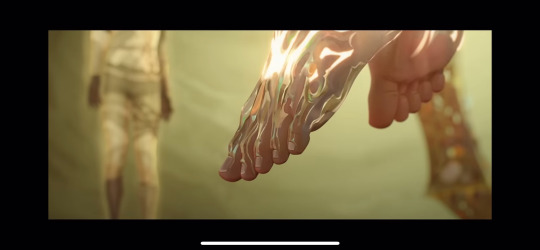
Don't even.
Also been seeing a lot on the shadowy golden-eyed figure and we figured that's near-certainly not him either.
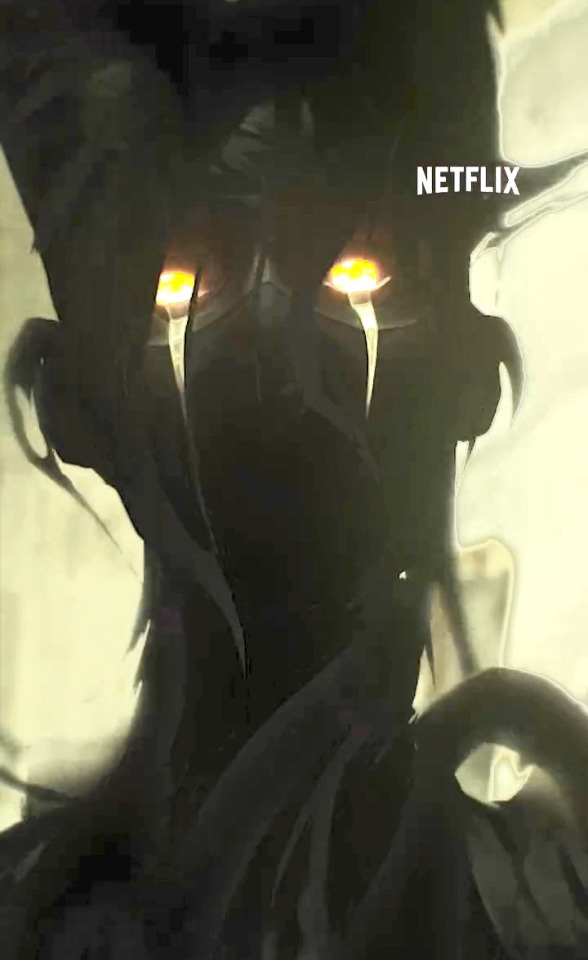
Looks sick, I'll admit. I kinda hope it's him, in fact. Most likely not him. Face shape is slightly too squared off, ears stick out too far, yes I went in deep on skull shape for this and I'm at least 75% sure that ain't him. And Viktor's magical influence/Hexcore spookiness has been defined by purple sinews and more organic forms than this more fantastical shadow tendril thing. This seems to be a new force entirely.
I won't discount it outright since Viktor's eyes are indeed associated with gold/amber but for all I know this could be Mel. Eye socket shape/nose does vaguely match. And Viktor's eyes would likely lean more towards a purple voidy glow in S2 if they're going all-in on the Hex Core.
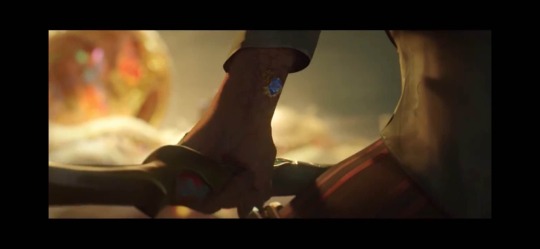
Possible Jayce cameo? Very obviously meant to be his wristband gem, maybe somehow got fused with his skin. The grip on the object appears heavy so it's not Viktor's cane/staff. Could very well be the Viktor/Jayce confrontation since if you squint there might a robed figure standing in front of that weird fuckin magic doodad.
Speaking of...
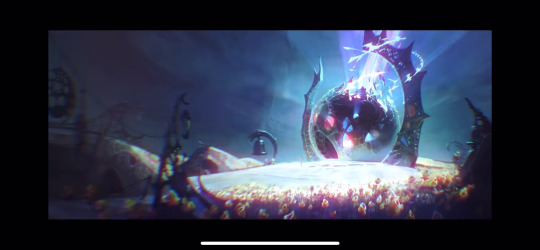
Saw a pretty interesting post from @nylloth saying this could be Viktor's "hospital" or maybe some kind of Glorious Evolved temple. It does resemble the fucked up glowing sinewy appearance of the Hex Core so perhaps some kind of hallucination or vision that Viktor is having of his potential. Would love to hear more thoughts on that though. It's very obviously related to "the Arcane" as a broader more mysterious force.
Wanted to be angrier here but I'm honestly just disappointed. Which is ass because pit fighter Vi and Ekko and revolutionary Jinx are all things I'm genuinely looking forward to but I can't rally it. I'm very glad everyone else ate good though. Does indeed look sick and I'm still excited. Pit fighter Vi especially. Holy fuck. But I'm just too bummed out about Viktor, call that dramatic or childish but idc it's how it is.
Be stingy about appearances and character designs but it could not have been difficult to include a single voice line. Don't even bother including it in the show, get a couple trailer-only lines or a "Glorious Evolution" or SOMETHING. Don't give me that "well their fates are still ambiguous" No they aren't lmao they just aren't. By this point everyone knows Jayce and Vik live and 50/50 on Mel.
If Viktor had not appeared in that teaser TWO MONTHS ago for like 2 seconds then it would be reasonable to assume he got erased from the show entirely lol. We have a shot of his arm to go off of until we hopefully get a proper Viktor poster. Cool. Nice arm.
That is all. For now. Please refrain from discussing leaks. I don't need any more temptation.
#arcane#viktor#arcane season 2#rambles#machine herald#I'll be happy about the other cool shit later I promise just lemme grieve in peace#jayce talis
64 notes
·
View notes
Note
A bit strange writing this, I am usually more of a silent observer than anything, mostly because I don’t usually “get close” to famous people in any way shape or form, so this whole situation and those two are weird for me. I am a skeptic and realist, so I don’t read into things that don’t concern me, but I am also a big romantic (contrary I know) so seeing those two together in interviews really made me invested in this situation, against all reason and instincts. All that said I am not easily excitable, I need proof and facts(which there are few in this situation but still), and proof is in N/L body language, gazes, occasional verbal slips, that are decidedly not platonic. It’s in how miserable and detached he is in every situation where the adjacent is involved (and presence of one would have been a deal breaker for me in any other scenario). A little explanation of my position in this.
Yesterday post, which created so many different reactions in this WH, for me, was obviously N reaction to all the hate L was receiving in his groomers’ post (which is absolutely disgusting), it is obvious that N is incredible protective of him. It actually feels a bit sassy to me, like that comment about his eye color “they are dark blue, which is a remarkable shade of blue”, as if she is saying “oh! you don’t like him? well I do! he is my friend actually!.”  (And before someone says that she is too sweet for sass like that: “Why did she wear a bra?!” “Because I liked it!”) It also should be obvious that even if everything is already resolved between them we are not going to get any conformation of it anytime soon, certainly not like this, not on SM, be realistic people. The reason for my bringing seemingly yesterdays’ news is because I just saw it again, a post not a story and the writing struck an idea in my mind.
“I thought I’d already shared this but I hadn’t so here you go now it’s all yours”
It obviously can mean nothing more than it seems to be, which is an excuse to post a picture and remind “fans” that it is her friend and costar they are hating on, and if they expect her to approve of it they can dream on.
The other one, is so far reached I am surprised that it even came to my mind. The wording is just so interesting if we read into it. I saw some putting negative meaning in them, like her letting him go. But if we believe that these past few weeks N has been hinting at something with her SM, and that it was in relation to L, can it not be another hint? “I thought I’d already shared this but I hadn’t so here you go now it’s all yours” - I thought I’d already told this, that it is HIM, but there still some questions and doubts so here you go, a lovely picture of us in our romantic roles smiling and looking happy, it’s yours now, so enjoy.
Obviously we don’t know, most likely never will know, what is happening bts, the reasons for their actions are their own and so they should be. We are not entitled to their minds and lives, but it’s interesting to speculate sometimes, respectfully. Love your blog, I didn’t expect to find a space of such rationality in the delulu land of shipping, especially regarding real people. 
💜🥃
90 notes
·
View notes
Text
A Thematic Analysis of Chapter 2’s Killer
Drdt spoilers. Obviously
There’s a lot of people who have started liking Ace more since this episode. I am not one of those people. He’s always been my favorite character. I’ve suffered from paranoia as well, and it sucks when people don’t take that shit seriously. Just because it’s irrational doesn’t mean it’s not harmful, and just because it’s stupid doesn’t mean the person suffering from it is stupid. I related to him a lot because of that. His issues are constantly downplayed by the people around him. Either that, or they think he’s irreversibly crazy for fears he can’t really control.
But besides that, I like him because his brain is fun to pick apart. He has so many problems. It’s a genuine shame he’ll never be able to get over them. It’s not the direction I expected his character to go, but it makes a lot of sense.
All that glitters is not gold.
The title made me think that a “good person” would be the killer, but it was Ace, a “bad person.” And his victim was Arei, another “bad person.” The people who died this chapter were the cast’s “worst people,” people who were outcast by everyone else for being bullied. But this chapter also shows their human sides—maybe they were only bad people because they were never given a chance to be good, like Arei. Maybe they were pushed to extremes because nobody treated their problems seriously, like Ace. Meanwhile, the cast’s “good people” are all revealed to be worse than they seemed. That was the thematic reason behind the motive secrets. Some of the others have done things far worse than Arei or Ace.
Nico was someone most of the cast liked. They were never mean to anyone, and they were constantly the victim of Ace’s bullying. They were easy to like, or at least easy to not hate. They quickly formed a bond with Hu (because Hu seeks out people she thinks need her protection). But in this chapter, they tried to kill someone. They admit themselves that it was reprehensible. Nico is a “bad person”.
Hu was supportive of everyone in chapter 1, positioning herself as a motherly figure. She was kind, caring, and helpful. But in chapter 2, she infantilized Nico to the point that she thought they can’t speak for themselves during the trial. She let biases cloud her judgement. She derailed the trial without good reason, because she wanted to be helpful to Nico, even when they weren’t asking for her help. Hu is a “bad person”.
Levi was called a good person by Eden at the start. He’s polite, takes care of other people, and reached out to Ace of all people. But in this chapter, it’s revealed that he did all of that for his own convenience. He doesn’t care about other people. He’s a murderer. He’s a “bad person”.
Levi threatened Ace, making Ace’s paranoia worse. Nico tried to kill Ace, confirming Ace’s idea that he was going to die if he didn’t get himself out of the killing game. Hu defended Nico, confirming Ace’s idea that everyone was against him.
The so-called “bad people” are cursed to die, while the so-called “good people” are shown to have been bad all along.
And isn’t that far more interesting than showing that good people can do bad things, and ending it like that? Now all the so-called “good people” have to live with the fact that their actions led to Arei’s death, without having been Arei’s actual killer. Arei was killed by the cast’s mistreatment, negligence, and trivialization of Ace Markey.
Thematically. Not literally, of course. Ace did that.
But their culpability in Arei and Ace’s deaths, even tangentially, shows in full color the consequences of letting their flaws go unchecked.
And in the context of Nico and Hu specifically, I can’t wait to see how that impacts them in the long run. Chapter 2 was all about facing the darkest sides of some of these characters. So wouldn’t it stand to reason that Ace’s death would influence some of them (like Nico) to examine their actions more closely and try to grow from them?
I can see Nico cutting off their friendship with Hu after this. She refused to acknowledge their fault in the situation. Since Nico is an objective person, I think they’ll understand the part they played in the Ace/Arei situation, and want other people to understand it as well. They won’t want Hu’s misplaced protection anymore.
And for Hu, I have no idea where she’s going after this. After her performance in this trial, where her flaws were pointed out to her by all the other characters, is she going to reflect and change? Or is she going to regress first, especially now that Ace, who she believed to be a villain, actually snapped and killed someone?
A big theme of chapter 2 has been growth. Ace shows the consequences of not growing. He was pushed to murder because of the rest of the cast not confronting their flaws, and he himself committed the murder because he didn’t know how to change.
It’s a bit of a hopeful spin on his death, but I’ll be honest—I’m still majorly bummed out about it. His life has just been terrible and will be terrible until it ends. He’s a horrible person with blood on his hands. He’s a coward and a bully who is hated by everyone. It’s all he’ll ever be, because he’ll die before having the chance to be someone else. Nico, through the sheer coincidence of having their murder interrupted, will be able to grow and change. Ace never will. A terrible life and a terrible death for a terrible person. And he won’t be missed. Not like Arei. Not like Min. Not like Xander. People like Nico, Rose, and Eden may feel bad about it, but no one will miss Ace specifically, because no one likes him.
If you were able to change and become a better person, it only means you were a good person to begin with.
If you weren’t able to change, it means you were doomed from the start. There’s no use trying.
There’s another world where people took Ace’s fears seriously. Where they didn’t dismiss him as a joke at the start and a volatile dog at the end. He might’ve survived if that happened. No matter what David says, bad people can change, if they know how to do it.
When this chapter finishes, I might make a full thematic analysis of it. There are still a bunch of things to say. I’ll just leave this post off with: Nico survivor stocks going up! Invest now!
#I’ll make a proper analysis of Ace one day too#Once we have more information about him…#Bonus episode perhaps!#In other news Eden has not been proven untrustworthy. Teruko can trust people now.#I’m glad#Too much killing game media undervalues good people#Ace dying here is a lot more narratively satisfying…it still hurts though#But about Eden—she’s always felt like an invaluable character foil to Teruko for me#Jokes on you! I’ve been shipping Terueden this whole time!#The power of just a good person with no caveats is so underrated in stories#Because it makes their actions more interesting. Why would such a person do a bad thing (like Eden with the fork?)#also why I love xander#This is so unrelated but to any TWST fans out there Kalim is an indispensable part of any killing game AU#I do not accept counterarguments#drdt spoilers#drdt#danganronpa: despair time#danganronpa despair time#ace markey#nico hakobyan#drdt analysis#hu jing#levi fontana
55 notes
·
View notes
Text
a few people were interested in my aspd dazai analysis but I feel like no one is seeing the reblog of the essay so it gets its own post now! yap ahead
A couple of days ago, I was having a conversation with an acquaintance about Dazai. At one point, I had offhandedly mentioned that I believe Dazai is someone who deals with ASPD. While I thought it was fairly obviously implied throughout the show, they were quick to disagree with me, offering instead the opinion of him having BPD. Now, I’m not one to start arguments over simple things like this and I could tell they were not the type of person who would enjoy a debate. So like any rational, passionate person, I decided to write a 5 page essay on it instead. In this essay I will elaborate on why I believe ASPD is a better fit diagnosis for Dazai than BPD, present evidence to support it, and talk about why I don’t think he has BPD.
Before we get into this, let’s talk about what exactly ASPD and BPD are. Disclaimer, I am not a professional, nor have I been formally diagnosed with either. So, I am not an expert. However, I do believe I’ve done enough research and have my own personal experiences with a large portion of symptoms of ASPD, as well as having several personal connections to people with BPD, to speak on this.
Antisocial Personality Disorder is a cluster B disorder characterised mostly by a frequent lack of understanding of empathy, using manipulation and/or deception to further one’s own needs or wants, and being generally apathetic towards people’s personal thoughts and feelings. People with ASPD often have a hard time discerning and comprehending morals, forming meaningful attachments with people around them, and caring about societal norms. Overall, the struggle of ASPD is mostly found with morality and empathy.
(I would like to note that just because someone may struggle with these things, it does not mean they are incapable of it. Someone with ASPD is just as able to love and be loved as the next person, they just have a more difficult time overcoming their own personal blocks in order to do so. Similarly, they may struggle with understanding morality but that does not mean they are incapable of conforming to what is widely considered right or wrong. They may have different reasons for being kind or just, such as ‘it’s too much trouble to be bad,’ ‘I like it when others tell me I’m a good person,’ or ‘it’s just what I’m supposed to do.’ This does not mean their actions are invalid, simply that they have differing motivations from the larger population.)
On the other hand, Borderline Personality Disorder, also cluster B, is most well known for intense and irregular mood swings, attachment and abandonment issues, and impulsive and self destructive behaviour. People who deal with BPD typically also struggle with mania, a warped and unstable sense of self, and intense and generally unjustified anger issues. The gist of BPD, at its core, is the inability to regulate thoughts and emotions. Someone with BPD may do a complete 180 emotionally because of something another individual may deem small or insignificant. A partner forgetting to text back could trigger emotions that have the same weight as if the partner were to break up with them. Someone who has just experienced the death of their father could suddenly the next day feel on top of the world, given the right prompting. BPD is all about the instability and insecurity regarding thoughts, feelings, or identity.
So! How does this relate to Dazai? I’m glad you asked!
Throughout the series, Dazai continuously shows signs and behavioural patterns aligning with that of someone with ASPD. He is constantly seen manipulating people and situations to get the results he desires, he’s outright stated to have no interest or understanding of ‘right’ and ‘wrong’, and it’s not uncommon to see him using or mistreating certain people in his life with little to no empathy or regret. The prevalence of this behaviour changes significantly with his transfer to the Armed Detective Agency, but is definitely still something that affects Dazai to this day. If he has to threaten to torture someone to get the information he wants, as seen with Kouyou after Kyouka was taken, or sacrifice one innocent person’s life to end a villain’s, as seen with Rokuzo and Miss Sasaki in his entrance exam, he has no issue doing such.
In the Dark Ages, Oda tells Dazai outright that he doesn’t care about morality. Dazai is as Dazai does, and he has no reservations doing things deemed evil to further his (or Mori’s) own goals. His list of crimes is extensive. His personal relationships are messy and toxic. He has no issue with lying, stealing, or killing. The only reason he decides to pursue the life of a good man is because someone he grew to care for, Oda, had requested it as his dying wish. It’s likely that in stating his understanding of Dazai’s views, or lack thereof, on good and evil, he proved to Dazai that he understood him. This is one of the main factors that convinced Dazai to take his wish into consideration. Knowing that Oda understood his true apathetic nature and still requested this of him convinced Dazai to give Oda’s ideologies a chance. Had Oda not asked it of Dazai, he likely would have stayed with the Port Mafia without much thought to it.
Manipulation is perhaps one of Dazai’s most well known traits. He’s famous for his schemes, his tricks, his ability to transform any person or situation into what he wants them to be. Take Akutagawa for example. Dazai is cruel to him with the interest of moulding him into something the Port Mafia (or himself, later on) can use. He has little to no regard for Akutagawa’s safety or emotions. This is something that, for the most part, follows him into his new life at the Armed Detective Agency. He says and does things to manipulate Akutagawa’s emotions to play in Dazai’s favour. He makes comments about Akutagawa being inferior to Atsushi (‘my new apprentice is superior to you in every way imaginable’), he uses Akutagawa’s admiration against him (ex. The Moby Dick, when Dazai has Atsushi throw the cellphone in order to distract Akutagawa), and he holds the promise of approval over his head in order to get Akutagawa to do things he typically wouldn’t (‘I hope to see you a little more competent now’ during the Cannibalism Arc as he’s told to work with Atsushi).
During the prison arc, Dazai is shown to play a game of chess with Fyodor. It’s obvious what the pieces on the board represent: each piece is a character. Every character plays a role in Dazai’s chess match against the Demon. He’s got his Queen, his Knights, his Bishop, etc. and he’ll manipulate them and the situation as he sees fit in order to win the match. One of the main components to his relationship with Fyodor is how similar they think. Dazai has stated on several occasions that the reason he’s able to predict Fyodor’s actions and plans is because ‘it’s what he would do.’ They share ideas, strategies, and behaviours. Both are prone to manipulation and deception in order to get what they want.
Some other noticeable examples that I’m too lazy to elaborate on but speak for themselves are the scene with the nurse and the phone, the scene where Dazai sends Atsushi to go investigate his own abuser’s death, and when Dazai manipulates Chuuya into joining the Port Mafia.
I’ve touched on deception a few times so far, but I felt it was significant enough to deserve its own paragraph. It’s not uncommon for Dazai to leave out important details, or tell outright lies in order to get what he wants. He lied to most of the members of the Agency about his past for years in order to keep his place there, assuming that they would shun them had they known. His entire personality is mostly a facade, putting up the mask of a silly detective man to avoid being taken too seriously.
He’s prone to apathy, and doesn’t really ever show any characters empathy throughout the series. When Atsushi is having a panic attack, Dazai’s instinct is to slap him back to reality rather than cater to his emotional needs. When Kunikida is upset by the results of his and Dazai’s actions in Dazai’s Entrance Exam, Dazai simply tells him that reality won’t conform to his ideals. After Chuuya is betrayed by the Sheep, Dazai uses his vulnerability to recruit him into the Port Mafia. It’s rare to see him act sympathetic with characters. This does not mean he doesn’t show kindness to them, but he clearly has difficulties empathising with people going through crises.
Along with others, he’s rather uncaring towards himself. Most of the times we’ve seen him in dangerous situations, he’s continued to act carefree and unbothered. When he was captured by the Port Mafia he had no reservations about provoking Akutagawa even though he knew it would cause himself harm. He also has consistently proven that he doesn’t care about his own life. Via attempts and jokes alike, he’s prone to suicide in a way that makes it obvious he holds very little value to himself. This doesn’t necessarily mean that he has a low sense of self, or that he’s insecure. He’s got a very solid opinion of himself. He just doesn’t care whether he’s dead or alive.
While Dazai struggles with all of these, it doesn’t mean he is incapable of doing good. His relationship with Oda was clearly genuine, and he obviously cared for him a great deal. He’s also the only reason Atsushi is alive right now, and he’s taken great care to give Atsushi a decent life. He’s a sufficient mentor for him, and he’s done a lot of good for Yokohama with the Armed Detective Agency. He’s come clean about his past to his friends, and overall has improved his way of life. Dazai has grown from the Demon Prodigy of the Port Mafia into a respectable man of justice. He still has moments where his apathetic side will shine through, but he’s clearly healed and developed quite a bit since joining the ADA.
‘Okay cool. So… what about BPD? He could share some symptoms. You haven’t talked about that since the intro paragraphs. Wasn’t this about ASPD and BPD? You suck. Loser.’
I’m getting there! Control yourself. It’s taken 14 paragraphs to get to this point. God forbid I be thorough with my analysis. SMH. Anyways.
Now that we’ve talked significantly enough about Dazai having ASPD, let’s touch on why I don’t think he has BPD. This is a headcanon I’ve seen frequently enough that I’ve formed an opinion on it. Obviously. That’s why I’m writing this essay.
The thing is, BPD relies on emotional instability and a disorganised attachment and sense of self. I don’t see any of that in Dazai. He has a fairly concrete opinion of himself and his identity. His emotional state is consistent throughout the show, excluding a few specific scenarios, and while he seems reckless and impulsive, he’s not. All of his actions are always carefully planned out, even if it doesn’t seem so.
Dazai is well known for his carefree and jokester persona. When he’s not playfully dumping his work on Atsushi or Kunikida, he’s cracking jokes and poking fun at the members of the Detective Agency. It’s not often that we see the mask slip off. When it does, though, it’s almost always when he’s reminiscing over Oda. That, or actively plotting against a formidable opponent he takes seriously. These are pretty normal situations to not be joking around in. The guy is grieving his dead best friend. Not exactly a drastic mood swing. Fairly run of the mill. Outside of this, we don’t ever see him react severely and unjustifiedly. His emotions are always carefully balanced.
(Note, I am aware of the scene with Akutagawa during the Dark Ages. Have patience. I’ll get to that eventually.)
We also don’t see him struggle with abandonment/attachment issues. He has the ‘everything worth wanting is lost the moment I obtain it’ mentality, but that doesn’t exactly prohibit him from forming bonds with the people around him. He’s fairly normal about everyone at the Armed Detective Agency. He obviously cares for Atsushi, and he doesn’t make any moves to push him or anyone else away—or become unhealthily attached, on the contrary—both of which are very common behaviours in people with BPD. He goes to their parties (I can’t exactly remember when, but I’m fairly certain he was there when Poe visited Ranpo during the ADA party, and on the yacht with the infamous ‘to the Stray Dogs’ scene), runs errands and completes chores with them (the Wan episode where he and Atsushi are cleaning lockers together), and makes a point to hang out with them outside of work (the fireworks festival we all know and love/hate).
He doesn’t struggle with his self image. It’s never implied that Dazai doesn’t know who he is or where he belongs. He doesn’t have any internal conflict about whether he’s Port Mafia or Armed Detective Agency; he’s actually quite firm on his stance. He rejects Mori’s offers and requests to return to the Mafia several times throughout the series. He’s secure in his sense of self. He has no issues admitting his strengths and flaws, and he knows who he is and what he wants.
The only time we’ve seen him become angry to the point of an extreme reaction is when Akutagawa doesn’t do as Dazai had wanted in the Dark Ages. He kills the hostages they had taken rather than prodding them for information. Dazai’s reaction, while definitely intense, was neither unprovoked nor unjustified in his point of view. Him shooting the gun at Akutagawa was both a punishment and a lesson. The pressure of a life or death situation was what provoked Akutagawa to finally grasp control over Rashomon in a way that would allow him to use Devoured Space. So while extreme, Dazai’s anger had reason to it.
I also would like to remind everyone that this scene was set during the time Dazai was in the Mafia. It’s understandable for the stakes and punishments to be intense. If a subordinate doesn’t learn a lesson quickly and efficiently, the consequences can range from a mild beating to the fall of an entire organisation. Dazai knew this as well, which is why he wasn’t going to tolerate impulsivity. Also it’s the Mafia. They’re like, known for guns and killing and shit.
Contrary to anger, mania is the state of intense highs, feeling like you’re on top of the world. People who experience mania often feel like they’re invincible, either physically or metaphorically. They may put themselves in harm’s way to prove that ‘nothing can hurt them,’ or risk all their money gambling because ‘they just can’t lose.’ They’re excitable, irrational, and impulsive. Dazai is none of these things. He puts himself in harm’s way to either attempt to destroy himself, or as a part of his plan to get things to play out the way he wants. Everything he does, while it may look impulsive, has a plan. The only thing I can think of within the series where he acts without thinking is in his entrance exam where he offers to drive the taxi for the thrill of the fact that he is actually a terrible fucking driver. If he gambles, he knows he’ll win. If he jumps, he hopes he’ll fall. His behaviour is always carefully thought out. Also he’s consistently depressed throughout the story, so. No room for that.
Now onto everyone's favourite topic, self destructive behaviour! It's pretty widely known and agreed upon that Dazai either does or has self-harmed before. Hence the bandages. He's also very loud and proud about his passion for suicide. This could count, it's definitely self destructive in the physical sense, but I don't believe it's because of BPD. I think the guy is just really fucking depressed. He just wants to die, it's not so much in an ‘I don't deserve good things or comfort’ way. I also want to touch on the more figurative methods of self destruction. He doesn't exactly go out of his way to sabotage himself in regards to his work, his relationships (he fucks with Chuuya, but he just generally enjoys riling him up), or anything like that. On the contrary, we see him actively putting effort into keeping those things stable. (Lying in order to keep his place at the ADA, being active in his social circle, working towards keeping the ADA and Yokohama in general safe.) So, not really self sabotage in a way that makes me think of BPD.
Overall, most of Dazai's struggles or traits fall under understanding empathy, morality, and manipulation. His actions throughout the series are not hard to connect to these patterns, and it doesn’t take much digging to find supporting evidence. All of his characterization leads to the conclusion of ASPD, rather than BPD. He isn't a very emotionally unregulated character, in my opinion. He’s level-headed, well managed, and secure in himself and his environment. The guy just doesn't quite know how to function as a human being with other human beings, but he's trying.
Also no you cannot change my mind. Anyways I've been writing for like 4 hours so goodbye.
#bsd#bungou stray dogs#bsd dazai#dazai osamu#dazai#aspd dazai#aspd#antisocial personality disorder#aspd safe#character analysis essay#character analysis#dazai analysis#bpd#borderline personality disorder#bpd safe#cluster b#cluster b safe#osamu dazai bsd#akrasianwords#essay
67 notes
·
View notes